
Yacht Crew Agency / The Ultimate Guide to Becoming a Yacht Stewardess: How to Get the Job of Your Dreams

The Ultimate Guide to Becoming a Yacht Stewardess: How to Get the Job of Your Dreams
- February 13, 2023
Becoming a yacht stewardess is a dream job for many women, who enjoy working in a luxurious, challenging, and dynamic environment. The job of a yacht stewardess involves providing first-class hospitality services to guests and crew members on board a superyacht. It requires a combination of technical skills, interpersonal skills, and a professional demeanor. In this article, we will guide you through the steps you need to follow to become a yacht stewardess and get the job of your dreams.
Step 1: Determine If You Meet the Basic Requirements
Before you start applying for yacht stewardess positions, it’s important to make sure that you meet the basic requirements for the job. Most yacht stewardesses are required to have:
- A minimum age of 21 years old
- A valid passport
- A high school diploma or equivalent
- Excellent communication skills in English
- Basic computer skills
- Good health and fitness
- The ability to work well under pressure
- A friendly and professional demeanor
Step 2: Obtain the Necessary Certifications and Training
To become a yacht stewardess, you need to have a basic understanding of maritime safety procedures and first aid. You can obtain this knowledge by taking the following courses:
- STCW (Standards of Training, Certification, and Watchkeeping)
- Basic Safety Training
- Personal Survival Techniques
- Fire Prevention and Firefighting
- First Aid/CPR
These courses can be taken at maritime training centers, community colleges, or online. It is recommended that you obtain these certifications before you start applying for yacht stewardess positions.
Step 3: Build Your Resume and Portfolio
Your resume and portfolio are crucial to getting hired as a yacht stewardess . Your resume should include your education, certifications, work experience, and skills. Your portfolio should include professional photos of yourself, references, and any relevant training certificates. Make sure your resume and portfolio are well-presented, professional, and tailored to the job you’re applying for.
Step 4: Network and Apply for Yacht Stewardess Jobs
Once you have your resume and portfolio ready, it’s time to start applying for yacht stewardess jobs. You can find job postings on yacht crew websites, LinkedIn, and other job search websites such as Yacht Crew Agency . You can also network with other yacht crew members, attend yacht crew events, and join yacht crew Facebook groups. When applying for a yacht stewardess job, make sure to include a cover letter that explains why you’re the right fit for the job.
Step 5: Ace the Interview and Impress the Yacht Owner
When you land an interview for a yacht stewardess position, make sure to dress professionally, arrive on time, and bring a copy of your resume and portfolio. Be prepared to answer questions about your skills, experience, and why you want to be a yacht stewardess. During the interview, make sure to showcase your professionalism, friendliness, and attention to detail. If you’re lucky enough to be offered a yacht stewardess position, make sure to impress the yacht owner with your positive attitude, hard work, and excellent customer service skills.
Additional Tips for Success
- Stay physically fit and maintain a healthy lifestyle, as the job can be physically demanding.
- Continuously improve your skills and stay up to date with industry trends and best practices.
- Be flexible and adaptable, as the job often involves working in changing environments and conditions.
- Be a team player and work well with others, as the job requires working closely with the crew and guests.
With these tips, you’ll be well on your way to becoming a successful yacht stewardess. Good luck!
Frequent questions on how to become a yacht stewardess
The job of a yacht stewardess is often a entry-level position and prior work experience is not always required. However, previous experience in the hospitality, customer service, or travel industries may be advantageous.
A friendly and professional demeanor is important for a yacht stewardess, as the job involves providing hospitality services to guests and crew members. Other important qualities include the ability to work well under pressure, good interpersonal skills, and a positive attitude.
While STCW, basic safety training, and first aid certifications are essential for a yacht stewardess, additional training or certifications in wine and cocktail service, culinary skills, or language proficiency could be beneficial and increase your chances of getting hired.
Social Chat is free, download and try it now here!

How to Become a Yacht Stewardess / Steward: An Experienced Insiders Guide
If you’re wondering how to become a yacht stewardess / steward, you’ve found the perfect starting point.
I’ve personally reaped the rewards of 10 magnificent years in the industry, where I started out as a yacht stewardess and worked my way up to Chief Stewardess. This has motivated me to help people like you that are wondering how to become a yachtie .
My goal here is to equip you with the best resources and knowledge for how to become a stewardess on a yacht. Make sure you follow these steps to ensure you successfully land your first job.

Table of Contents
Yacht Steward / Yacht Stewardess Job Description
As a Yacht Stewardess or Steward, you are responsible for all the interior operations of the vessel. This will include tasks such as housekeeping, laundry and high-end food and beverage service.
Interior Tasks Include:
- 5 star food and beverage service
- Flower arranging
- Table scaping
- Laundry Care
- Interior housekeeping
- Updating interior inventories
- Accounting and budgeting
- Liaising with guests and co-ordinating activities

1. What Qualifications Do You Need to be a Yacht Stewardess or Steward?
In order to become a stewardess on a yacht, you will need to have an STCW Certification and pass an ENG1 medical.
The STCW (Standards of Training and Certification of Watch keeping) is an internationally mandated course and a minimum requirement for anyone who wishes to work on a yacht.
Throughout the training, crew members will acquire the necessary skills to handle emergency situations and ensure the safety of all onboard. They will also learn safe working practices to ensure the safety of themselves and their fellow crew members.
In 2010 the STCW convention added a new module requirement to the basic safety training, so ensure that you do the additional Proficiency in Security Awareness (PSA) module which takes one extra day.
This STCW course is comprised of 4 modules, takes 5 days to complete, and is valid for 5 years. The modules include:
- Personal Survival Techniques (PST)
- Fire Fighting and prevention (FFP)
- Elementary First Aid (EFA)
- Personal Safety and Social Responsibility (PSSR)
If you aim to work on vessels of +50m in size you may also need to hold the PDSD (Proficiency in Designated Security duties) course. This is a one-day online course for anyone who may be involved in security duties such as being a watch keeper.
To work on a yacht, you must undergo a basic medical examination called an ENG1. This assessment is performed by a doctor certified by the Maritime Coastguard Agency (MCA) to ensure that you are healthy enough to work on a yacht.
A list of MCA-approved doctors can be found here .

2. Recommended Courses if You want to Become a Yacht Stewardess / Steward
In order to become a Yacht Stewardess or Steward you do not necessarily need to hold any other courses or certifications. The courses you choose to do would be more so to boost your confidence and gain better insight into being a stewardess on a yacht.
Hood Hygiene and Safety Level 2
Although this course is not mandatory, I highly recommend you do it as most vessels require anyone handling food (Stews included) to hold this certification. There are a few variations of the course so just ensure that the one you do is MCA approved.
The purpose of this certification is to equip crew members with the skills to assume personal accountability for food safety. This involves understanding the importance of maintaining cleanliness and hygiene in both personal work areas and food preparation.
Introductory Yacht Steward/ Yacht Stewardess Training
These courses are generally held over 5 days, and include everything you need to know about how to get into yachting as a Stewardess or Steward, as well as what your job will entail.
You will learn all the basic elements of housekeeping, laundry, service, floristry, wine knowledge, and onboard living etiquette.
These courses are not essential, but extremely helpful in having you better understand what will be required of you if you want to become a Yacht Stew.

3. Create the Perfect Yacht CV
If you are wondering how become a Yacht Stewardess with no experience, you are going to need to make sure your Yacht CV stands out from the rest.
Besides a well-laid out resume, you also need to highlight why you are the best candidate for this specific job that you are applying for. Be sure to highlight ANY transferable skills you may have to offer the industry. This could be hospitality experience, floristry, baby-sitting, yoga, or maybe you are a masseuse.

4. Apply for your Visa if Necessary
To work as a stewardess on a Super Yacht, you will need to look into your personal situation and passport to identify which visa you need.
B1/B2 VISA – Needed to enter the United States and surrounding waters
Shengen Visa – Needed to enter Europe for the Mediterranean season
5. Locate Yourself in the Right Place at the Right Time
Once you are ready to head over to a yachting hub, you need to consider the time of year you are going. Ideally, you want to arrive a few weeks before the season starts. There are 2 seasons in yachting:
The United States and Caribbean Winter Season (November/December to March/April)
The biggest hub for yachting in America is Fort Lauderdale, and in the Caribbean, it is Antigua and St Maarten.
Please note that if you are not a green card holder or US citizen, I do not recommend flying into America and actively seeking work. This is illegal and could get you into trouble.
The Mediterranean Summer Season (April/May to September/October)
If you’re looking for the ideal spot in the Mediterranean, consider Antibes in the South of France. It’s a top yachting hub with plenty of crew houses and yacht agents. Plus, you’re within easy reach of other sought-after destinations like Monaco and Nice.
Palma, located on the island of Mallorca, is also a major hub for yachting. It boasts numerous marinas, agents, and crew housing facilities.

6. Day Working and Dock Walking for a Yacht Stewardess / Steward
“Daywork” is when you get hired on a day-to-day basis, earning cash and assisting boats as they need extra help onboard.
Daywork is a great way to get experience as a Yacht Stewardess or Steward. If you make a good impression on the Captain and Crew, this could lead to a permanent position onboard or a referral to another boat.
“ Dock Walking ” is when you walk the docks of marina’s handing out your CV in the hopes of being hired for day work.
7. Sign up with Yacht Crew Agencies
You will want to sign up with as many yacht crew agencies as possible. Here are some popular agencies you should sign up with to get started: Luxury Yacht Group, Blue Water Yachting, The Crew Network, Cotton Crews, Yot Spot, Northrop and Johnson, HR Crew and Burgess.
To stay updated on job postings, it’s important to check social media platforms like Facebook. Join various yachting Facebook groups such as Fort Lauderdale Yacht Crew, Palma Yacht Crew, and Antibes Yacht Crew. You want to keep checking these groups regularly to stay informed.
Yacht Steward / Yacht Stewardess Salary
As with everything in the industry, your salary is largely dependent on the size of the vessel, your experience in the industry, as well as your qualifications.
A starting salary for a Yacht Stewardess or Steward can range from $2500-$3500. From there you can expect to see annual salary increments as you spend more time in the industry.
If you want to set some goals, a Chief Stewardess’s salary can be upwards of $5000 – $9000. Possibly even more depending on the size of the vessel!
On top of these very attractive salaries , you may also have opportunities to earn more money in the form of charter tips and annual bonuses.

Roles and Responsibilities of a Yacht Stewardess or Steward
The housekeeping stew.
The role of a Housekeeping Stew is to clean and maintain all aspects of the interior of the vessel . Guest cabins and common areas need to be meticulously cleaned with a lot of care and attention to detail. They will also be cleaning crew areas such as the crew mess and bridge.
Cleaning the vessel is not as simple as it seems. You will be vacuuming, dusting, polishing, tooth-picking grooves, ear budding ledges, and working with delicate surfaces.
The Laundry Stew
The Laundry Stew is responsible for laundering, stain treating, ironing, and maintaining laundry for the entire vessel. This includes crew uniform, crew personal clothing, guest clothing, beach towels, bath towels, table linens, rags, and kitchen tea towels.
The job of a Laundry Stewardess is in fact a very meticulous one, as you will be dealing with a number of different fabrics and colors. A simple mistake could cost the boss a very expensive dress.
The Service Stew
The role of the Service Stewardess is to ensure that every want and need of the guests is met. As far as service goes, you will be serving 3 meals a day, afternoon canapes, sunset cocktails, and all the other beverages and snacks in between.
You may also be required to head over to the beach to do service if there is a beach set up, or go for a cruise on the tender to serve drinks and snacks. A fun part of the role is also of course the tablescaping, which is usually most Stewardesses’ favorite aspect of the job.

At-home Tasks for Your Personal Growth
There are a number of things you can do to boost your confidence as a Yacht Stewardess or Steward before joining the industry. I can assure you that personal skills and experience come preferred over certifications.
Take your time to do research, link up to the social media accounts of established stewardesses and get involved with any work or transferable skills that will boost your resume.
All of these tasks, to list a few, can be practiced at home and will impress your future employer.
- Napkin folding
- Table setting
- Cocktail making
- Making beds
- Toilet paper folds

Final Thoughts on Becoming a Yacht Stewardess / Steward
Some of you may find it easy to become a Yacht Stewardess or steward, and some of you may bump into some hurdles along the way.
Either way, my advice to you is to keep your head up and stay positive.
Work hard, put in extra effort wherever possible, keep smiling, and be a positive energy bubble in your work environment. Your efforts will pay off and soon you will be reveling in the world of Yachting. I hope to see you out there!
If you need any more advice I would be more than happy to assist you personally. Please pop me an email in the contact section.

Hi, my name is Lisa, a Chief Stewardess in the yachting industry with 10 years of experience, as well as 8 years of hospitality experience prior to that. Being in the yachting industry has been a whirlwind of adventure, growth, challenges and some of the best experiences of my life, and I am excited to share my knowledge and experiences with all of you.
7 Best Antibes Crew Houses: Where to stay for first-timers
Fort lauderdale crew houses: 21 of the best crew accommodations, 3 thoughts on “how to become a yacht stewardess / steward: an experienced insiders guide”.
Thank you for such helpful content!
Hi I’m interested in a position to be a Stewardess and to work in the bar or a restaurant on the boat . I would love to apply for a position in the mediterranean, I’m not sure where to start or if I have to do a course .
Hello Chelsea. When you are starting out in the Super Yachting Industry (not cruise ships) your role is more likely to include housekeeping and laundry. With more years of experience, your role will become more diverse and include bar tending and service. If you are looking to better understand the role of a Stewardess before joining the industry, then I have a great post on a Day in the Life of a Yacht Stewardess. If you are interested in joining the industry, then this article lists out everything you need to do to find your first job. Good Luck!
Leave a Comment Cancel reply
Save my name, email, and website in this browser for the next time I comment.

- Career Advice
- Salary Guide
- Digital Dockwalk
How to Get a Job as a Yacht Stewardess

Kate got her start in the yachting industry working as crew. She spent five years cruising the Bahamas, Caribbean, New England, and Central America, then segued that experience into a career in marine journalism, including stints as editor of Dockwalk and ShowBoats International .
If you’re not afraid of hard work, have a knack for hospitality and service, and are a team player, then traveling the globe as superyacht stewardess could be in your future. Here is everything you need to know to land a job as a stewardess on a luxury yacht...
A yacht stewardess (or steward) is an entry-level position in yachting that provides a gateway to a career in hospitality at sea. A stewardess serves a vital role as part of the interior team and is responsible for the upkeep and presentation of the interior of a vessel.
One of the greatest appeals of working as interior crew on a superyacht (other than travel and tips ) is that the role of a stewardess doesn’t require extensive schooling or qualifications. While experience in the hospitality or customer service sector is advantageous, when starting out as a junior steward or stewardess, it is more about having a friendly disposition and being willing to learn and work hard.
“The ideal junior stewardess will have an eagerness to absorb information and learn the ropes properly, the ability to take direction and follow instructions, as well as the confidence to ask questions when clarification or additional instruction is needed,” says Sarah Bester with Northrop & Johnson Crew Services .
What is a Yacht Stewardess?
A steward or stewardess maintains the interior of a superyacht and provides five-star service to its owners and guests. On charter or owner trips, the interior team handles beverage and meal service, housekeeping, and laundry, all with the highest attention to detail. They have the most face time with guests so are responsible for relaying their wishes to the deck department, chef, and captain.
What Does a Yacht Stewardess do?
A junior member of an interior team on a yacht larger than 45 to 50 meters will typically start his or her career in the laundry room and/or in housekeeping rather than in service.
On smaller boats, the stewardess can be a department of one. “If you’re a solo stew you’ll be up early doing it all,” says Alene Keenan, a 30-year veteran of interior work who has literally written the book on yacht service, The Yacht Guru’s Bible. The day starts with opening duties: “setting up for breakfast, preparing breakfast, serving and clearing breakfast, laundry, cabin service, housekeeping duties, more laundry,” lists Keenan. This is followed by lunch service and more housekeeping and laundry, ongoing beverage service, setting up for afternoon activities, cocktails and hors d’oeuvres service, dinner service, cabin turndowns, finishing and returning laundry, and to close the day, pulling dishes, décor, and service items for the next day’s breakfast.
“If you have two or more interior crew, the duties are shared and probably rotated, and start times depend on hours of work and rest,” Keenan says.
- Top Tips For Working as a Stewardess
On larger yachts, the chief stew will provide his or her team with a checklist of duties to perform for each shift. “The routine will generally be the same,” says Chief Stewardess Tracey Bamforth . “You will be allocated a shift, shift duties, and shift expectations. You will wake up and dress in your on-charter uniform, making sure you are presentable, fresh, and on time. It’s important to remember that when the guests are on, your need to manage yourself to the best of your ability: speaking softly, working smartly, being very aware of your environment — for example, not leaving cleaning products out and about and keeping the yacht to its absolute best standard.”
Off-charter is when maintenance, deep cleaning, and inventorying are done in addition to daily laundry, crew mess, and bridge duties.
Who Does a Yacht Stewardess Report to?
This varies depending on the size of the yacht and crew. “Every yacht is unique and could have a different set-up; nothing is black or white,” says Lien Eggermont, senior yacht placement consultant for interior crew at Viking Crew .
Generally, when a stewardess works alone, they report to the captain. When there are two or more in the interior department, the junior would report to the chief stewardess, or with larger teams, they may even report to the second steward/ess. For the largest of superyachts, each interior division — housekeeping, laundry and service — will have their own head of department (HOD), so for example a housekeeping stewardess would report to the head of housekeeping.
What Qualifications Do I Need to Become a Yacht Stewardess?
All crew need STCW basic safety training , a five-day course, and an ENG1 medical certificate , and some yachts may also require certification in Food Safety & Hygiene, a one-day course.
On top of these necessities, there are numerous options for yacht-specific interior training, but many chief stews, like Robert, prefer to teach on the job. “Most of the skills you need in yachting, especially in the interior, you learn as you go,” she says.
The amount of knowledge you need going in may depend on when you’re hired. “Early in the season, the HOD will have time to train and teach everything from scratch. Mid-season they don’t have time to hold somebody’s hand — in the nicest possible way — and will need somebody who can hit the ground running,” Eggermont says.
Courses that introduce entry-level candidates to yacht interior work are offered in many countries around the world. “Bluewater hosts some fantastic courses; their Yacht Interior Service courses start at a zero-to-hero course and can really help with a newbie or green stewardess who wants to acclimate and understand the principles and products used on a vessel,” Bamforth says.
Bester points out that additional courses like silver service and WSET (Wine & Spirit Education Trust) can help a candidate stand out. “These courses are an additional investment and thus an indication that the candidate may be more career minded,” she says.
- Recommendations for Entry-Level Interior Crew
“Training has always been a privilege in my mind,” adds Bamforth. “Most newbies starting out will already be stretched from arriving from a new country, trying to find a new role, living in a crew house, and then to expect them to start off with a couple thousand dollars in courses under their belts is somewhat unfair. I believe in the ability to train and trial a newbie and give them the opportunity to show you they have the capacity to work, learn, live in a very close environment with others, repeat the systems they are learning, and, most importantly, have a good attitude!”
Maxine Robert, chief stewardess on 47-meter M/Y Loon , adds, “Having a positive attitude is everything as we live in such close quarters and work very closely with each other every day.”
What Experience Do I Need?
“Many programs will consider junior stew candidates who are green to yachting but come with strong land-based hospitality experience,” says Bester. Eggermont seconds this: “Waitressing in high-end restaurants or hotels, background in events, housekeeper in a hotel or, for example, a boutique B&B. But also candidates who have worked on board cruise ships or river cruises will be considered.”
Keenan points out a wide range of work experiences on land that translate to interior work at sea, listing: “restaurant/hotel work, flower arranging , event planning, retail sales, anything with customer service.”
Furthermore, Bamforth says she considers a potential new hire’s complete background, including things like whether they have finished university — “my thoughts would be that they have a ‘stick it out to the end’ attitude, and an ability to think on their own, which is always a plus,” — or if they played team sports at school — “shows an aptitude for playing nicely with people.” She says she has enjoyed working with hires from a wide variety of backgrounds, from advertising to having a family member who is a florist. “Nurses or medical-trained candidates I find to be extremely empathic and good with other crewmembers,” she says.
How Much Does a Yacht Stewardess Earn?
The entry-level starting salary can range from $2,500 to $3,500 per month, says Bester at Northrop & Johnson. “Charter programs will typically be on the lower end of the salary range due to the additional income crew receive through charter tips,” she says. Eggermont at Viking Crew says the average is €2,500 per month.
Dockwalk conducts an annual salary survey that polls both placement agencies and working yacht crew. According to its most recent 2020 Salary Survey , the low end of the range given by agencies — where most junior crew would start — is between $2,250 and $2,800 per month. Interior crew who aren’t working as the chief or solo self-reported that they made from $3,000 to $4,500 per month, with the bigger bucks being netted on bigger vessels.
The earning potential of interior crew grows alongside experience. At the top of their game, a chief steward/ess on a vessel longer than 70 meters earns $7,000 to $12,000 per month, says Dockwalk ’s wage guide.
“I’d say don’t be too picky as a junior crewmember,” Eggermont says. “If a 90-meter-plus (yacht) offers you a role at €2,000 with potentially an increase after probation or so, I’d say take it. Do a season, do your best so that you get a great reference. You need a foot in the door!”
Related articles:
- What are the Different Crew Roles on a Luxury Yacht?
- How to Get a Job as a Yacht Chef
- Everything You Need to Know About STCW Training
- What is the ENG1 Medical Certificate and Why Do I Need it?
More from Dockwalk
Most popular on dockwalk.

Keep up to date with Smart Move
How to Become a Yacht Stewardess: Everything You Need to Know About the Job
Posted on: 11/26/2018

The annual salary for a yacht stewardess starts at around $40,000 plus tips. While that may not seem like a lot to some, while you are living on the ship all of your expenses will be covered by the charter guest.
Being a yacht stewardess is a great way to see the world, meet incredible people, be fed every meal by a great chef, and live a more present lifestyle free of cell phones and constant connection. Away from your family and friends on the open water, you will find peace and adventure.
Read on to learn how to become a yacht stewardess and begin your dream career today.

How to Become a Yacht Stewardess: The Education Requirements
If you want to land a job as a stewardess, you will need to take some short courses that ensure safety and good service on the yacht.
If you are looking for an entry-level position, then you will take the most standard courses, while those looking to become a chief stewardess will have to go back to school for further certifications.
When you are first getting started in the yachting industry, you will need to complete an STCW certification course at an academy like the Maritime Professional Training Academy in Fort Lauderdale.
This course costs around a thousand dollars and is typically completed over about a week-long time range.
How Hard is it to Get Hired as a Stewardess?
Getting hired as a stewardess aboard a yacht is generally not considered to be difficult. Once you have your STCW certification, you will be legally qualified to take a position.
In order to get a job, you should move to a major port city. In the United States, nine times out of ten that is going to mean Fort Lauderdale. Your other option is Newport in Rhode Island. While there are other cities in the country where you may be able to find a position, these hotspots are the best place for those new to the industry to scoop up work.
Once you land in the city, you can hit the docks with your resume looking for people who need to fill positions. In this industry, when you need someone, you need them now, so be prepared to start as soon as the next day.
If you have any hospitality experience such as bartending or entertaining guests, this is helpful to list on your resume.
What Time of Year Do They Hire in Fort Lauderdale?
To get hired as a stewardess, you should head to Fort Lauderdale in between seasons. This is where you will find the most stationary yachts giving you the best chance of landing a position.
There are two primary yachting seasons - summer and winter. To get hired for the summer season, you will need to be in Fort Lauderdale between April and June. For the winter season, you should arrive between September and mid-December.
These down-times are when yachts are in port preparing for the next season and you will be able to set up interviews with many different ship captains or owners at one time.
Those are also the months that you would have off once you become part of a crew while the yachts are repaired and maintained for the next season.

What Do I Do if I Don't Get Hired There?
When you are new to the yachting industry (the term is "green"), you may find it difficult to secure a position. When you begin asking around for advice, many experienced crew members will tell you to head to St. Martin to look for work.
St. Martin is where many of the yachts head and make a port out of for the season. If you are there you can often find positions that crop up from other stewardesses who didn't work out or were unable to fulfill their obligation.
In order to do this, you will need to purchase a round-trip ticket in order to get through customs. You can cancel your returning flight at a later date if you find a position.
If you choose this route, be cautious when you talk to customs people at the airport. Don't tell them that you are coming to look for work. It can raise a lot of questions and prevent your entry in some cases. Just like how people coming to America aren't able to work, there are similar visa requirements for the island.
However, since you will be hired aboard an international vessel, those laws won't apply to you. But trying to explain all of that to an ornery customs agent isn't the best way to spend your first twelve hours in the city.

Consider Registering with a Crew Agency
One of the best ways to find open positions aboard yachts is by registering with a crew agency. They will be able to pair you up with openings and act as an advocate on your behalf.
Before you hit the agency, make sure you spruce up your resume. You need to sell your abilities and talents to potential captains.
These agencies typically don't require any fee from you to join, so you might as well give it a shot. The agencies are paid by the ship captains once they agree to your placement.
If you go with an agency, you will still need to attend individual interviews and secure the position in the same way you would if you found it on your own. It's just a great way to aggregate leads and provides a lot of exposure for your resume bringing you more potential opportunities.
To stay on an agencies books, you will need to check in with them weekly while you are in between gigs. This is so that they can ensure that you are still available. Once you find placement, you will be required to check out.
Make sure you follow through with doing this or you may find it difficult to work with the same agent when you are in need of work again.
Networking Tips
Once you move to town, you will need to begin by walking the docks and meeting people. Dress professionally and make friends, this is a social industry where the right recommendation can go a long way.
Be proactive and positive while you network. You need to be confident in yourself and your ability to find a job if you want anyone else to believe in you.
Useful Skills to Have
While anyone can find a home aboard a yacht with the right attitude and certifications, there are certain skills that will move you up the hiring list.
Those that have basic cooking skills, experience babysitting, formal service training, experience working in a bar or food service, mechanical experience, carpentry skills, and diving experience will all find it much easier to find work and they can also help you command more pay.
How to Secure the Most Pay
When you are first starting out as a crew member, your salary is usually a baseline. Over time, as you gain experience, you will be able to command a higher salary.
Other factors that impact your wage include the size of the boat, the number of responsibilities that you will have, whether the vessel is chartered or for private use, and your ability to make a commitment to being on board long term.
Jobs that offer other benefits like medical and vacation time may offer lower pay as a trade-off, so decide what is important to you before you decide what vessels to head to look for work.

A Note on Commitment
When you step aboard a yacht as a crew member for the first time, you will be very excited and eager to get started. But over time with subsequent charters, you may begin to lose your excitement, especially if your charter guests are particularly difficult or if you get into an argument with another crew member.
While cruising around the world is a dream come true for many, you have to remember that it isn't a vacation. You will be expected to work hospitality hours, which are long and hard and often go late into the night.
You will also have to contend with the personalities of the other crew members and try not to step on anyone's toes, both while you're staying in Fort Lauderdale and on your ship. If you don't have an easy-going personality type, then this may not be the position for you.
Once you take a job on a yacht, you need to make sure that you finish out your contract if you want to find employment anywhere else. Don't allow gossip, bad etiquette and drama to ruin your potential career.
Where to Stay While Finding a Position
Having learned how to become a yacht stewardess, you know your next step needs to be certification and moving to Fort Lauderdale to find a position.
Check out these great listings for a safe, affordable place to stay .

10 things nobody tells you before being a Yacht Stewardess
From a Stew to Future Stews , here are 10 things no one tells you before you become a yacht stewardess…
- You will laugh until you cry and cry until you laugh somedays as you are challenged physically, mentally and emotionally. Remember to be kind to yourself.
- You quickly develop a new love for a hoover (vacuum cleaner) learn to drive him correctly (without hitting any walls), clean him, add smelly things to make his aroma lovely, and also that hoovering a roof is a thing.
- As a stewardess you learn to basically become a professional housewife by the end.
- You will learn a whole new level of cleanliness and absolutely become an organised OCD human & clean freak when you return home (From Towel and toilet paper folds to obsession over labelling unnecessary things like your fridge compartments and linen cupboards).

- You will never have to worry about what’s for lunch or dinner or even breakfast again. You will have probably gain weight on your first season as you have every temptation under the sun at your fingertips. However then you discover exercise again and moderation.
- Your toiletries on most boats are all paid for… including shampoo, face wash, deo, moisturiser and more!
- You get used to sea-sickness. You don’t necessarily ever get over sea sickness. However you learn to deal with it as you can’t let your team down.
- Your days on charter are often 14 hours long (sometimes more), and in season this can mean working these hours everyday for 3-4 months. You get used to it and learn elevating your legs is SO important.
- You will learn to become an inconspicuous cleaning fairy who is rarely seen and heard however is secretly communicating every guest movement on the radio to the crew.
- You don’t have a routine, you take each experience as it comes and at the end of the day feel very grateful for all the people you meet along the way and the places you will see, by boat.
Tips were provided by Jess: www.theseaworthystew.com
Recent articles:

Email address:
Remember me Forgotten password?
Password Reset
Enter your email address and we will email you a password reset link.
Email address:

What is a Yacht Stewardess? A Complete Guide

Written by Virtual Yacht Assistant
November 5, 2023.
Introduction:
Are you passionate about travel, luxury, and providing exceptional hospitality? If so, a career as a yacht stewardess might be perfect for you! Yacht stewardesses play a crucial role in ensuring that guests' experiences onboard a luxury yacht are nothing short of extraordinary. In this blog post, we'll delve into various aspects of this exciting career, including qualifications, prior experience, job responsibilities, salaries, challenges, and the potential for growth within the industry.
Qualifications:
To become a yacht stewardess, certain qualifications are highly desirable. Firstly, possessing excellent communication and interpersonal skills is essential. Clear and effective communication is a primary factor in providing top-notch service to yacht guests. Additionally, having exceptional organizational abilities, attention to detail, and problem-solving skills will serve you well in this role.
Experience in the hospitality industry will come in handy when applying for work, this includes any sea going exposure, spa experience, diving qualifications, photography, events management, bartending, teaching and child-care. There are compulsory qualifications required in order to qualify as a Seafarer able to go to sea, and these qualifications include STCW (Standards of Training, Certification, and Watchkeeping), Food Safety and Hygiene Level II & ENG1/SAMSA Medical. Other qualifications such as Deckhand, Stewardess, Chef and Masseuse courses will add value to your CV and make you more confident in the role.
Previous Experience:
While prior experience in the yachting industry is advantageous, it is not always mandatory. Relevant experience from the hospitality or service industry works just as well, as it demonstrates your ability to maintain exceptional standards of service and cater to guests' needs. Previous work experience in luxury hotels, high-end restaurants, event planning, or customer service roles can be highly beneficial when applying for yacht stewardess positions. Spa/beauty therapy and photography skills are increasingly demanded by yacht owners, opening up a space for individuals qualified in those roles to transfer to the yachting industry.
Job Responsibilities:
As a yacht stewardess, your responsibilities will encompass various aspects of guest service and vessel maintenance. Your primary focus will be ensuring that guests have a memorable and comfortable experience on the yacht. This includes attending to guests' needs, serving meals and drinks, organizing events and activities, maintaining cleanliness, and assisting with safety protocols. You may also be responsible for managing inventories, provisioning supplies, and handling administrative tasks.
Yacht stewardess salaries vary depending on several factors, such as the size and type of the yacht, level of experience, expertise, and the region. Salaries can range from $1800 - $ 3000 per month as a junior Steward/ess. Additionally, many yacht steward/esses receive tips from satisfied guests, which can significantly increase their earnings.
Challenges:
Working as a yacht stewardess can be demanding. You'll need to adapt to long working hours, irregular schedules, and the high expectations of guests. Attention to detail is crucial, as any service shortcomings can impact the overall guest experience. Additionally, being away from family and friends for extended periods can be challenging, as yacht crew members often spend weeks or months at sea. Your mental health also gets impacted over the duration of your career, working long hours and not being able to eat or exercise properly can take a toll on you.
Career opportunities:
While starting as a yacht stewardess is an excellent entry point, it can pave the way for diverse career paths within the yachting industry. With dedication and experience, you can progress to positions such as chief stewardess, purser, or even yacht manager. Alternatively, you may choose to transfer your skills to other sectors of the luxury hospitality industry, event planning, or pursue entrepreneurship by starting your own yacht service business.
Being a yacht stewardess is a thrilling and rewarding career choice for those who love travel, providing top-notch service, and working in a luxurious environment. With the right qualifications, relevant experience, and a passion for excellence, you can embark on an exciting journey that offers incredible growth potential. So, if you thrive in a dynamic and customer-oriented environment, consider becoming a yacht stewardess and see where this path takes you!
You May Also Like…

Are Yachting Certifications Worth the Investment?
Feb 8, 2024
Embarking on a career in the yachting industry is an exciting prospect for many; it blends the allure of the open seas...

Becoming a Yacht Chef - The Ins & Outs
Yachting is an enchanting industry that offers unique and exciting opportunities for those with a passion for cooking...

Does it matter which Academy I choose for my Yachting Course?
When embarking on a career in the luxury yachting industry, getting the right certifications from a reputable academy...
Work On A Yacht
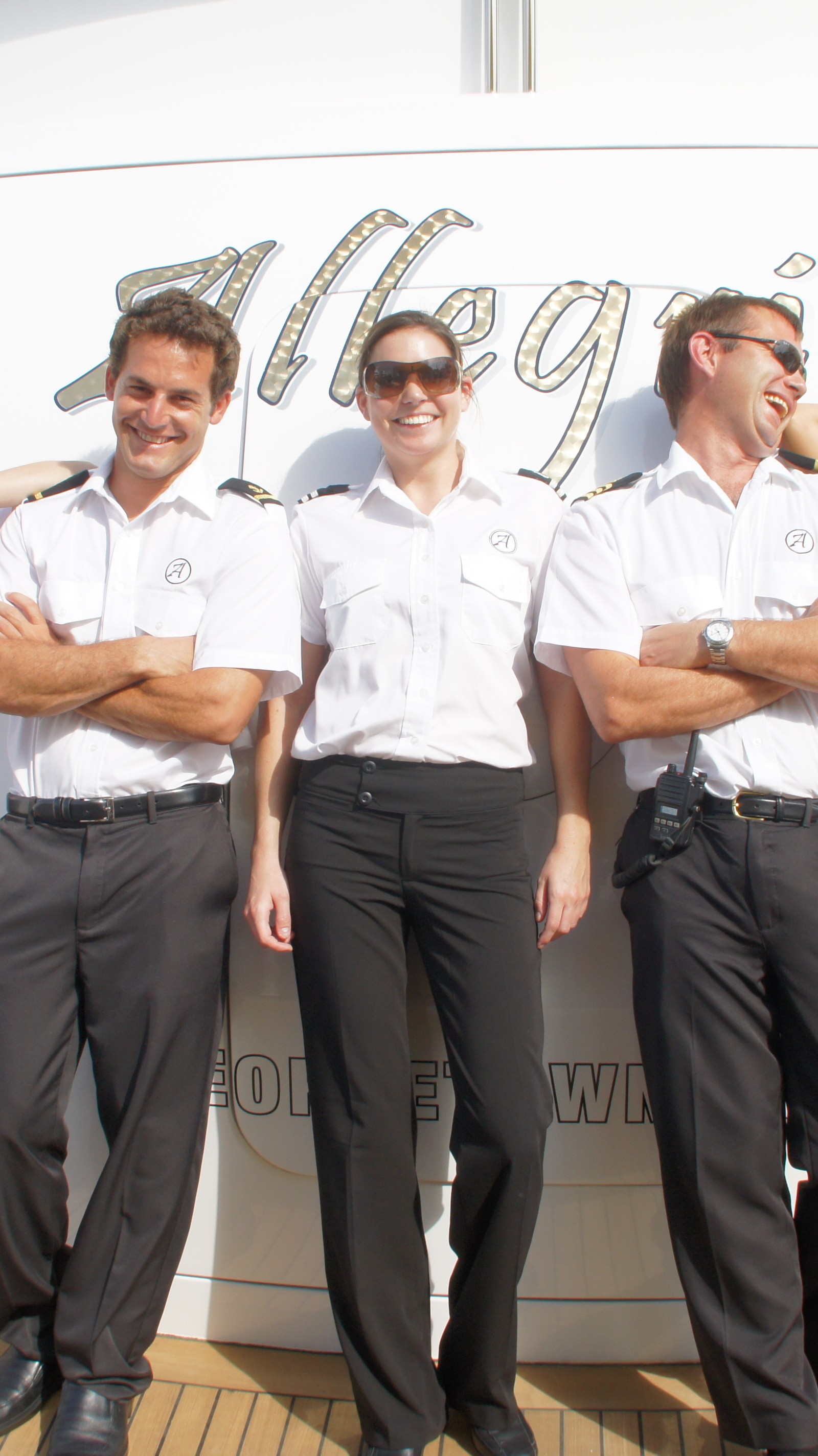
From the Blog Subscribe Now
Official Yacht Stewardess Job Descriptions and Salaries (Including a Salary Chart)
June 12, 2018 By Julie Perry
For some even more straight-from-the-book fun, I present to you below the official job descriptions for the various yacht steward/ess roles. These are pulled directly from The Insiders’ Guide to Becoming a Yacht Stewardess Chapter 3—a chapter that actually contains descriptions for each of the positions onboard, from Captain to Engineer, and from Executive Chef to Deckhand. And they are all presented with accompanying salary ranges.

The Crew of Megayacht “Allegria” (2010). Photo by Suki Finnerty of YachtingToday.TV
So if you’re interested in a yachting career in another department outside of a superyacht’s interior, consider picking up a copy of my book to learn more . (The “how to get started” information in Part II of the book really does pertain to most any entry-level position.)
Official Yacht Steward/ess Job Descriptions
Meanwhile, here are your yacht stewardess job descriptions, with a detailed salary chart found at the end of this post:
CHIEF STEWAR/DESS (Annual Salary Range: $39,000–$96,000+)
Job Function —The chief stewardess will carry out his or her duties and responsibilities under the direction and authority of the captain. As the person ultimately responsible for the interior of the vessel and for providing superior hospitality service to meet the owner’s and guests’ expectations, the chief stew will also train and manage any lower-ranking stews under his or her supervision. Excellent service, host/ess, and managerial skills are a necessity, as is having a good degree of creative flair.
Responsibilities
- Responsible for the everyday smooth operation of the boat’s interior department, which means being adept in the arts of housekeeping services, laundry procedures and wardrobe management, food and beverage service and cleanup, and entertaining (while maintaining proper etiquette and a high-energy, can-do attitude at all times)
- Responsible for directing, motivating, and training the lower-ranked stews (2nd, 3rd, and so on)—if any are onboard—which includes the assignment and scheduling of rotational duties and implementing Human Resources (HR) procedures and guidelines
- Providing valet services and overall guest care. Note: In the hospitality industry, “valet” refers to any employee who performs personal services for guests (and refers to more than just parking cars, which is what we normally associate it with). With regard to yacht stews, valet services include tasks such as packing and unpacking guests’ luggage, caring for their personal items and specialty garments, and even making daily activity arrangements for them.
- Protecting, maintaining, and caring for valuable interior items and surfaces, such as artwork, silks, china, crystal, linens, fine woodwork, and marbles
- Creating, implementing, and monitoring a financial planning system that includes accounting and budgeting for interior department needs
- Creating, implementing, and maintaining an informational management system of interior inventories and maintenance procedures
- Provisioning to maintain inventory supplies and cover guest usage
- Collaborating with the executive chef regarding meal service for the guests
- Creative planning and quality service of theme dinners and occasional guest parties
- Keeping all interior storage areas organized, orderly, and maintained
- Crew uniform purchasing
- Writing and updating all interior manuals and guest-information documents
- Maintaining and displaying knowledge of international etiquette and protocol
- Watchkeeping in accordance with the list of responsibilities in the crew mess
- Exterior-crew support as needed (requiring proficiency with exterior lines and fenders)
- Selecting, purchasing, and serving fine wines, specialty teas, and cigars, which may require advanced training
- Planning and managing destination experiences proficiently
- Assuming full responsibility for certain onboard safety tasks (as assigned by the first mate) in an emergency
Qualifications —A chief stewardess should possess some type of training and experience in the areas of bartending, silver service, cigar service, and wine presentation and service. (The more extensive a stew’s wine knowledge, the better.) STCW BST certification is now mandatory for a chief-stew position, and previous yachting experience on either charter or private vessels is most always required. It is also recommended that you obtain an ENG1 Seafarer Medical Certificate, or its equivalent. Floral arranging and table decorating skills prove to be an advantage, while an Advanced/Medical First Aid Certificate or a higher degree of medical training is also a major bonus. In fact, many chief stews are now taking courses to become certified as a yacht’s Medical Person-in-Charge. This requires a seven-day course that will satisfy the standards set forth by the STCW Code A-VI/4, 4.4-4.6, offered at many of the marine training schools. While the new PYA Interior-Crew G.U.E.S.T certification is not mandatory (as of July 2013), it is wise to follow the courses outlined and seek out equivalent intermediate and/or advanced interior-crew training classes, if not sign up for the full PYA G.U.E.S.T course modules.
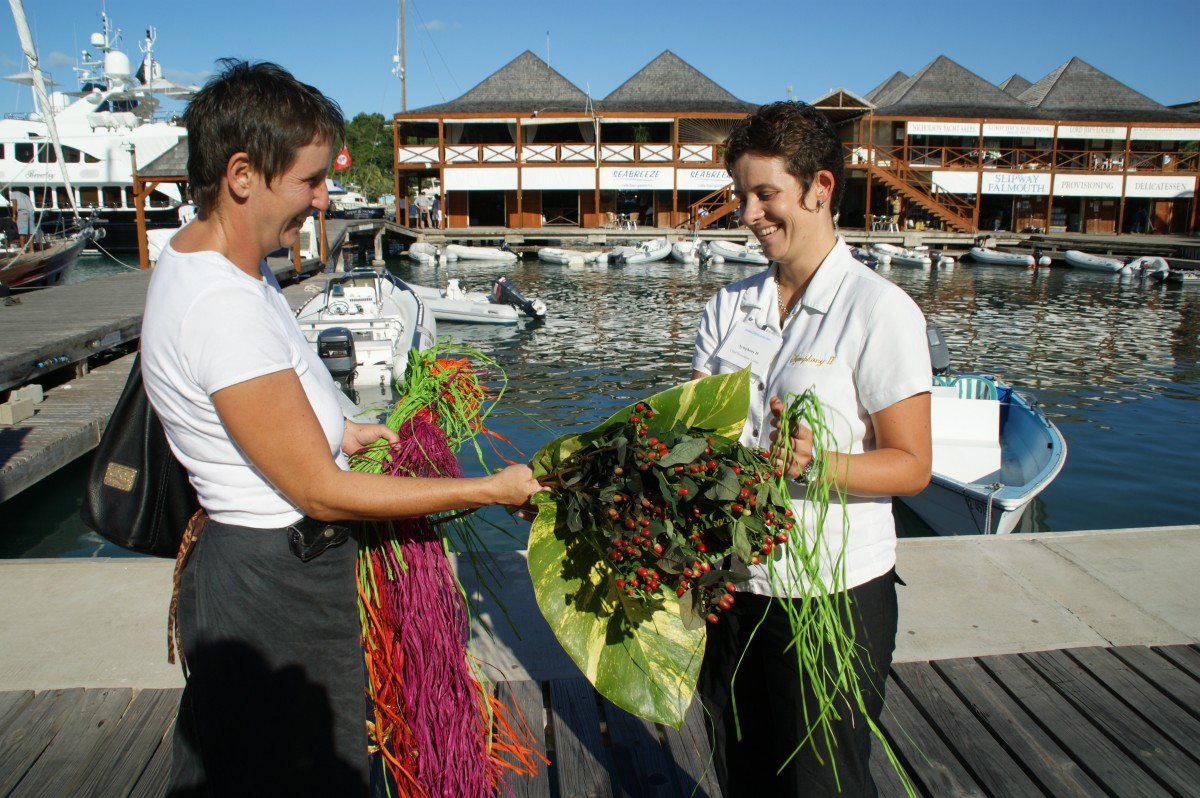
A Chief Superyacht Stewardess handles the ordering of provisions and other guest amenities for the yacht, which might include things like floral displays that the interior crew is too overwhelmed to handle on its own. While that may sound like an easy task, consider that no matter how many years a yacht stew has been doing this job, he or she will always end up in a new port (sometimes half-way around the world). First, he or she must find a reputable vendor. And not only do fresh flower arrangements need to be ordered, but they must be paid for as well. A chief stew must keep thorough accounting throughout a trip and make sure all vendors and provisioners are paid from the right accounts. Photo Credit: Suki Finnerty of YachtingToday.TV.
STEWARDESS—2nd and 3rd Stews; sometimes referred to as Senior and Junior Stews (Annual Salary Range: $30,000–$54,000+)
Job Function —A 2nd or 3rd stew will carry out his or her duties and responsibilities under the direction and authority of the chief stew and the captain. Individuals holding these positions are responsible for assisting with the maintenance of the interior of the vessel and providing superior hospitable service, in line with the owner’s and guest’s expectations. Hostess skills should be well developed to fully accommodate the owners and their guests while onboard.
- Maintaining interior housekeeping during a trip (detail cleaning) while also being held largely responsible for guest-cabin care
- Laundry, ironing, and other wardrobe maintenance tasks for guests and sometimes crew (when guests are onboard)
- Applying excellent guest service (including silver service) and expert bartending skills when called upon
- Guest care and valet services
- Assisting in the creative planning and quality service of theme dinners
- Assisting with physical product inventories, provisioning, writing and updating checklists, and all other applicable tasks within interior
- Exterior-crew support as needed
Qualifications —This is an entry-level position; while previous yachting experience is not required, it does bring added salary benefits. STCW BST certification is now mandatory for obtaining even entry-level work on a megayacht. It is also recommended that you obtain an ENG1 Seafarer Medical Certificate, or its equivalent. Table service, bartending, and cocktail-service experience or equivalent qualification are crucial to landing a job—training and certification recommendations for these can be found in Chapter 7 of The Insiders’ Guide to Becoming a Yacht Stewardess. While the new PYA Interior-Crew G.U.E.S.T certification is not mandatory (as of July 2013), it is wise to follow the courses outlined and seek out equivalent introductory interior-crew training classes, if not sign up for the full PYA G.U.E.S.T introduction modules.

Yacht Stewardesses at Work Photo Credit: Suki Finnerty of YachtingToday.TV
Dual Positions
On smaller and midsize vessels, where not as many crewmembers are needed (nor is there room for them), the core crew positions listed in the last section are often fused into what I call “dual positions.” An individual hired into such a position will assume a dual role and be expected to wear more than one “hat” during the course of a day.
Here are some examples:
- Deckhand-Stew
- 2nd Engineer-Deckhand
- Captain-Engineer
- Stew-Purser
Steward/ess Salaries
According to Dockwalk’s annual Crew Salary Survey in September 2013 , steward/esses are making a wide variety of salaries these days, and the amount of experience and training they have makes a difference. Of course, the size of the yachts will also be a factor. Compensation for chief stews runs anywhere from $3,450 to $5,650 a month on smaller yachts (80 to 140 feet) to $5,200 to $8,000 a month on yachts over 140 feet. It is very common now to see $65K and $70K salaries, or even $90K+ on the much larger vessels. Salaries for entry-level yacht stewardesses start out between $30K–$43K a year, or $2,500–$3,600 a month.
Base salaries for stewardesses, when compared with those of food and beverage servers, cabin stews, and laundry staff on cruise ships, are slightly higher. But where the potential income differences become dramatic is when you consider the tips one can earn working on luxury charter yachts, or the bonuses and perks afforded the crew on solely private yachts.
Here is a table that sums up salary ranges for the various stew roles within the interior department on a megayacht / superyacht:
Steward/ess Salary Ranges
| STEWARD/ESS RANK | UNDER 100 FT. (30M) | 100–140 FT. (30–40M) | 140–180 FT. (40–55M) | OVER 180 FT. (55+M) |
|---|---|---|---|---|
| TOTAL # OF CREW | 1–4 | 4–8 | 6–12 | 12+ |
| Chief Steward/ess (sometimes called a Head Steward/ess) | $3,300–$4,000 pm or $39K–$48K pa | $4,000–$5,500 pm or $48K–$66K pa | $5,200–$7,000 pm or $62K–$84K pa | $7,000–$8,000+ pm or $84K–$96K+ pa |
| 2nd Steward/ess (sometimes called a 1st or Senior Steward/ess) | N/A | $3,000–$3,800 pm or $36K–$45K pa | $3,300–$4,500 pm or $39K–$54K pa | $4,000–$4,500+ pm or $48K–$54K+ pa |
| 3rd Steward/ess (sometimes called a Junior Steward/ess) | N/A | $2,500–$3,200 pm or $30K–$38K pa | $2,800–$3,400 pm or $33K–$40K pa | $3,000–$3,600 pm or $36K–$43K pa |
| pm = per month • pa = per annual Crew salary information taken from various online and agency sources and cross-checked against Dockwalk’s annual Crew Salary Survey, September 2012. | ||||
While annual salary guidelines are given above, again, keep in mind that the ranges are wide because salaries will depend on a variety of factors, including the size of the yacht, the use of the yacht (private or charter), the style of boat (power or sail), and what other benefits are available to the crew, such as insurance packages or education reimbursement. Salaries may also vary depending on the specific qualifications of a crewmember, the amount of time the owner and guests use the vessel, and what itinerary will be traveled. Furthermore (and I cannot emphasize this enough), the compensation ranges listed are base salaries and do not reflect tips, if those are applicable.
Yacht Crew Have Got 99 Problems, But Living Expenses Ain’t One of Them
The first thing people always say after I give them the above salary figures: “Gee, is that all? I thought you said it paid well?” And someone will always add, “Oh, well I can get paid that same amount to take an entry-level office job.”
But here’s the kicker: no expenses.
Most all positions on luxury yachts require you to live aboard and travel with the vessel, and therefore, your room and board are completely covered. It is customary and expected that everything you need on a daily basis is provided by the yacht owner—your meals, your uniforms, laundry detergent, linens, and on most boats, even your personal hygiene products, such as soap and toothpaste. Meanwhile, your earnings automatically go into your bank account.
What other job can you take where, at the end of the year, you have nearly your entire salary sitting in your bank account, relatively untouched? Most people in other industries are lucky if they save 1/10 of the amount they earn in a year. Why? Because they are paying rent and utilities, buying and maintaining cars, and purchasing all the clothes they wear to work each day. And let’s not forget groceries.
Ready to find out how to get started one your way to working on a yacht? All the advice you need to land that first yacht job can be found in this guide . Good luck!

Megayacht crewmembers. Photo Source: Suki Finnerty of YachtingToday.TV.
Interested in more advice on how to become a yacht stewardess and what it takes to handle the job? Download Chapter 1 of The Insiders’ Guide to Becoming a Yacht Stewardess 2nd Edition here .

September 11, 2013 at 6:01 pm
This is something I really would like to do !! I’m going to check into getting the training !!
[…] some even more straight-from-the-book fun, click here to check out official “job descriptions” for the various yacht stewardess roles on a …, pulled directly from The Insiders’ Guide to Becoming a Yacht Stewardess’ Chapter 3. Even […]
[…] as engineers. Then you work your way up to captain, mate, chief engineer, chief steward/ess; and the salaries in those higher-level positions are outstanding, and then you have the tips, […]
[…] then travel around and see the world. Our guest today is Indy native Julie Perry. She worked as a yacht stewardess…and then wrote about it with her first book. Then she wrote a second edition that just came […]
[…] watching the full season of Below Deck, and based on my own experience as a superyacht stewardess, I feel Captain Lee made decisions that a truly professional captain would make. It is also Captain […]
About Julie Perry
Our latest tweets.
Julie Perry Follow 7,708 9,355
We're off and cruising now! Learn more about the @yachtsexclusive business model and our early success with an idea whose time has come in the #yachting industry... Simply put, it's #yachtingsmarter. via @BizObserverFL #yachtingindustry #luxurytravel

Yacht subscription business off to smooth start | Business Observer
Naples-based Exclusive Yachts offers the first subscription-based membership club for luxury yacht experiences. Two keys ...
www.businessobserverfl.com
Having fun with our Exclusive Yachts execs and crew in Naples last week... What a wonderful team! ⚓
Well done to Irma & Melveen Malabanan, turning their 20 years of yachting experience into a fun and fabulous business! Note that Irma also trains interior yacht crew at @savvymaritime. She's pretty amazing! #yachtcrew #tablescape #southflorida

Stylish Soirees with Le Tablescape - Fort Lauderdale Illustrated
From Friendsgiving fun to Thanksgiving feasts, a tablescape sets the tone.
fortlauderdaleillustrated.com
Get Our Email Newsletter
- Name * First Last
- Phone This field is for validation purposes and should be left unchanged.

Guide to Becoming a Yacht Stewardess Working on Superyachts
This working on superyachts guide is a authored by Carryn.
Working on superyachts seems glamorous, right? Your office overlooks crystal clear waters and your job involves stepping into the life of the rich and famous.
Not to mention, you get paid a fortune whilst doing so! But, as with most things in life, there’s more to the yachting industry than what meets the eye.
This guide details all the steps to getting a job working on a super yacht and what life is really like as a yacht stewardess — the good, the bad and the ugly!
Table of Contents
Before I Became a Yacht Stewardess
After 6 months working on a superyacht, is it easy to get a job working on superyachts, connections within the yachting industry, other qualities needed to become a yacht stewardess, the salary for a yacht stewardness, 1. do you want to become a yacht stewardess or a deckhand, role of a yacht stewardess working on a super yacht, role of a deckhand, other positions available for working on superyachts, 2. requirements for working on superyachts, 3. where to get a job: the mediterranean or the caribbean, 4. visa requirements for working on superyachts, 5. working on a private yacht vs a chartered yacht, 6. how to land that job as a yacht stewardess, register with yacht crew agencies, networking with other crew and yacht stewardesses, how much does it cost to work on a super yacht, what is life really like working on superyachts, how i got my job working on a superyacht, 1. how much time do you have to get a job, 2. do you believe in yourself, 3. are you ready to work your ass off every single day, how to become a ski instructor almost anywhere in the world, how to be a travel nanny and work as you travel, how to be an au pair in spain + tips for getting a job, how to work abroad & travel the world, how you can work abroad without experience so you can travel longer.
After graduating from college in South Africa, I jumped straight into the working world and started “adulting”.
After 3 months of long, hard work, with very little pay, I decided that I was tired of being broke and living in debt.
In an attempt to see just how versatile my skills were, I quit my job in search of greener pastures on the other side of the world, France. Here, I began what I thought would be a lifelong career as a yacht stewardess. I was intrigued by the idea of working on superyachts, how glamorous it all was and of course the MONEY.
Working as a yacht stewardess changed my life for the better. When I left for France I was a young, naive college graduate who struggled to find a balance between traveling and being financially independent.
6 months later, which is a lot earlier than I’d expected, I decided to throw in the towel. The money I’d made was amazing yet never gave me the job satisfaction I was actually looking for. I returned home with a new-found love for my country, my family and the smaller things in life.
Working on superyachts put my life into perspective.
It was an extremely personal time filled with self-reflection and allowed me to appreciate and value my own personal skills and work ethic.

Working on Superyachts: The Basics
A superyacht is a large luxury boat that’s longer than 24 meters. These yachts are owned by the rich and famous and often make their way between the Caribbean and the Mediterranean waters.
These superyachts need crew to provide them with that 1st class service. And this is where the thousands of yachties come into play.
People often confuse working on superyachts with that of working on cruise ships. No, they are not the same! Working on a superyacht is a far more intimate job. There can be two to twelve guests on board and you’re at their beck and call 24 hours a day, 7 days a week.
It’s a grueling job that will have you working long hours in confined spaces, but the rewards are far greater than those of the cruise ships.
Yes and no.
The yachting industry is a difficult one to get into, but once you have your foot in the door, you’re guaranteed future work and better positions. However, getting that first job working on a superyacht is the hardest part.
You will struggle to secure a job in advance as most captains and crew agencies want to meet you in person before they hire you. As a result, you need to go to the yachting hubs where you will spend your time job hunting.
Securing a job takes time. For some, it’s a matter of days, but for most, it takes weeks or even months.

The saying “It’s not what you know, it’s who you know” never rang so true as it does in the yachting world. If you have connections in the industry, you shouldn’t have a problem getting a job as a yacht stewardess.
The yachting industry is a small one and referrals are the easiest way to land your first job.
Owners want young, good-looking crew running around after them. As a yacht stewardess, your uniform consists of short skirts and tight shirts and you need to look presentable and professional at all times. If you fit this profile of a yacht stewardess, finding a job working on a superyacht will be a lot easier for you.
Your personality and drive also play a huge factor. Captains and owners want outgoing, energetic and friendly crew who will get on well with the rest of the team.
You have very little personal space and whilst conflicts are bound to happen, you will have to master the art of the “smile and walk away” and avoid confrontations with other crew and guests.
So yes, getting a job working on superyachts isn’t easy, but if you have the above points covered, I bet you could get a job!
The starting salary for a yacht stewardess or deckhand is roughly 2,500€ per month. This is with no experience and excludes 10% tips — which you receive on chartered trips. These tips could quite easily match your base salary. And it’s all tax-free!
You have no rent to pay as you live on board the boat. Your meals are prepared for you by the qualified chef, and you don’t need to purchase any groceries or toiletries.
EVERYTHING is covered. What I saved in 5 months whilst working on superyachts has taken me a full year to make as an English Teacher in Korea !

Sounds too good to be true, doesn’t it?
How to Work on a Superyacht: 6 Steps
Each of these superyachts needs 6-10 crew who all work together to ensure the smooth running of the luxury vessel. There are many positions available ranging from engineers to chefs but most crew start off as either a yacht stewardess or a deckhand.
As a yacht stewardess or stew, as it’s more commonly referred to, your main tasks are housekeeping and ensuring that the interior of the yacht is properly maintained. You need to provide the highest standards of hospitality and ensure that the guests are taken care of. To put it bluntly, you’re a glorified maid wearing a cute outfit!
Daily Tasks of a Yacht Stewardess
As a yacht stewardess, your daily tasks whilst working on a private yacht include meticulous cleaning of the interior of the boat such as the cabins, toilets and living areas. You’re responsible for all the laundry, ironing as well as flower arranging, and table setting for all meals.
You need to provide a silver service dining experience and make world-class cocktails whenever the guests request. If there are children on board your yacht, you may also be asked to keep them entertained whilst ensuring all your other tasks are completed.
Working Hours
Your days start when the first guest awakes and end when the last guest goes to bed! If they’re out clubbing until 4 am, you’ll have to stay up to welcome them back on board and perhaps serve them drinks upon their return.
There are no free weekends if you’re on charter and you rotate shifts with the other crew, who also work just as hard. Because of this, the hours are long and tiring and if you have demanding guests, you could feel completely broken by the end of it.
The workload and the sort of work changes depending on the season, whether you have guests on board and any maintenance issues.
The deckhand’s position is more geared for men and includes maintaining the exterior of the yacht as well as all the deck equipment. You scrub the boat, top to bottom and it’s a physically demanding role. Tasks include cleaning the engine, painting, and varnishing the deck. You’re in charge of the fenders and ropes as well as the tenders and jet skis.
Perhaps you’re a qualified chef, engineer or beautician. These jobs are also available but with no prior yachting experience, you will struggle to find positions available.
You may want to apply as either a yacht stewardess or deckhand first, and highlight these additional skills in your CV. This is because there are more opportunities for stews and deckhands. Captains will also be reluctant to hire a chef or engineer who’s doesn’t have experience working on superyachts as the demands are different from those of the normal day job.
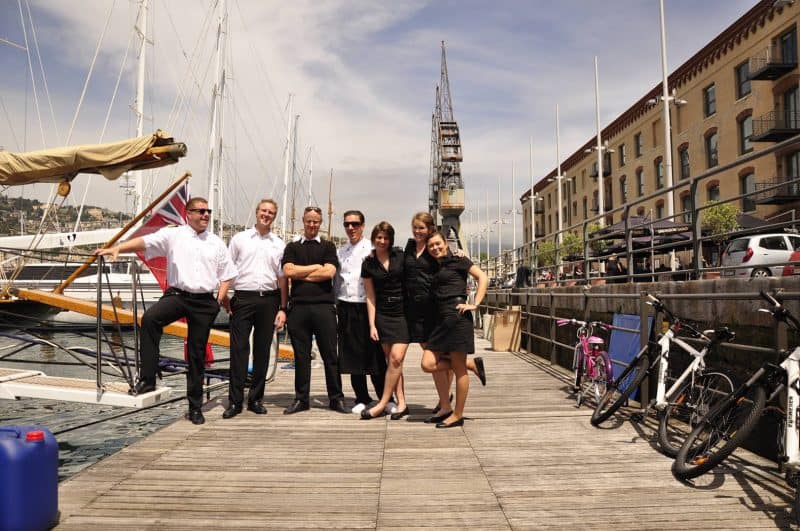
To find a job working on superyachts, there are a few basic requirements that you need to meet.
STCW stands for Standards of Training, Certification, and Watchkeeping for Seafarers. There are 5 modules that need to be completed within this required course. These include:
- Personal Safety & Social Responsibilities (PSSR)
- Fire Fighting
- Personal Survival Techniques (PST)
- Proficiency in Designated Security Duties (PDSD)
Eng 1 (Seafarer Medical Certificate)
This is an exam to ensure you don’t suffer from any existing medical condition that may deter you from performing your job. You’ll be required to take a urine sample and a doctor will perform a physical exam to ensure you have no issues with your sight or hearing.
Additional Courses to Work on a Superyacht
Once you’ve secured your position, your chief stewardess or captain will conduct proper in-house training to ensure you know how to work on a yacht and complete the tasks to their standards.
The below courses will prepare you for your new job and will add value to your yachting CV, but they are costly and are not a requirement.
- Stewardess courses where they cover interior care skills, silver service, table setting, cocktail service as well as flower arranging.
- Food Safety Certificate Level 2 . This certification applies to crew working on MLC compliant yachts. Service personnel such as chefs and yacht stewardesses working out of the galley will need this food hygiene certification.
- Powerboat Level 2 allows you to ride the tender and is beneficial for deckhands.
There are 2 yachting seasons: The Mediterranean and the Caribbean Season.
Each of these areas has yachting hubs where crew base themselves when looking for work. These towns are filled with aspiring yachties all gunning for the same position. Once the season is complete, your yacht may move to warmer waters or dock in the harbor until the winter season has passed.
The Mediterranean Yachting Season
The yachting season in the Mediterranean starts as early as April where these superyachts start crewing up and the season continues until August. The main hubs to look for work in the Mediterranean include Antibes in France and Palma de Mallorca in Spain.
The Caribbean Yachting Season
The Caribbean season is active all year round with September to March being the busiest months. Ft. Lauderdale in Florida is the main hub which attracts hundreds of crew every year. From here the boats move toward Antigua and St. Maarten in the Caribbean and as well as the Bahamas where guests enjoy the crystal-clear waters and tropical islands.
- Caribbean: If you’re heading to the United States of America, you’ll need a B1/B2 Visa.
- Mediterranean: A Schengen visa is required if you are going to France or Spain.
- Seaman’s Book: Once you find a job working on a super yacht, you need to arrange a seaman’s book. This is recognized as proof that you are working on a yacht and is also a compulsory document when applying for a transit visa.

There are two kinds of superyachts: Private yachts and chartered yachts.
Private Yachts
Private yachts are used exclusively by the owner.
In some cases, the owner may use the yacht a few times a season and so the crew will have a more relaxed schedule. But don’t take this for granted. I spent 5 months working on a private yacht and had guests on board every day!
Chartered Yachts
Chartered yachts are hired by groups of people for a shorter duration.
You usually have a day or two to get the yacht ready for each charter. This means that the guests are always changing, and the routes are very busy. However, it’s standard for the crew to receive 10-20% tips from the guests. Not too bad if you ask me!
So you’ve completed your yachting courses and you’ve decided whether you’re going to the Mediterranean or the Caribbean. Flights are booked, and visas have been organized. Now, you need to get a job working on a superyacht.
Find a Crew House for the First Week After Your Arrival
These crew houses are like hostels catering for new yachties. They are slightly more expensive than other accommodation you can find. However, it’s worth staying in a crew house for the first week while you try to find your way around your new surroundings.
If you’re heading to the South of France, I highly recommend “The Crew Grapevine” which is where I started off.
The crew houses are generally a stone’s throw away from the harbor and the staff working there understand the yachting world and will help you find your feet.
The owners of these crew houses are also highly respected in the industry and if you make a good impression, they may put in a good word for you with a captain they know. The crew houses also include free printing which is great when you have to print out hundreds of CVs.

Reserving Your Spot at a Crew House
These crew houses are extremely popular and because of the uncertainty of the yachting industry, you cannot book your spot in advance. Some people land a job working on a private yacht after 2 days and so they leave the crew house immediately, others only leave after 2 months!
The best way to get into a crew house is to keep in contact with them when you start organizing your trip.
Introduce yourself and let them know your plans. Then, a week before your arrival, mail them each day to see if they have openings available. I received an email confirming my booking the day I landed in France. Talk about cutting it fine!
After your first week, you would know your way around and would have met other yachties. Together you can rent an apartment for the rest of your stay as this is a far more affordable option.
Finding Daywork on a Yacht
Daywork is temporary work on board a superyacht where you help the other crew complete their duties, but you don’t stay on board the boat.
Daywork on a yacht is a great way of earning money and building up your CV whilst looking for a permanent job as a yacht stewardess.
You get paid $100 – $150 for the days’ work and this should be enough to keep you going for a few extra days.
Dock Walking
As the name suggests, dock walking involves walking through the marinas in search of work on a yacht. With a big, friendly smile on your face, you approach the many superyachts and hand your CV over to the crew.
You’ll most likely face rejection as the boats will have crew but hold your head up high and keep going! For tips on how to create the perfect CV, check this post out.
Security at some of these docks has become extremely tight and dock walking is not allowed in some marinas. This is especially true in the US so perhaps you need to look at some of the below options when looking for work on a yacht.
Yachts are interesting locations to work; you’re often plunged into very formal environments, so professionalism is key.
Yacht crew agencies are often the first port of call for captains looking for a yacht stewardess or deckhand. Registering with these crew agencies can be done through an online application where you include your work experience, qualifications, current location and contact details. This is followed by an interview which needs to be done in person.
This is the easiest way to get a job working on superyachts but if you don’t make an impression, they won’t remember you.
Making connections within the industry is of utmost importance when looking for a job as a yacht stewardess. Put yourself out there and find a common interest with other crew you meet. If they like you, they’ll pass your details onto their captains.
But of course, be aware that every new yachtie is looking to make these connections. You need to stand out from the rest and avoid hanging out in spots that only attract new crew.

Getting a job as a yacht stewardess can take days, weeks and even months. However, I firmly believe that this is dependent on the individual. I’ve met people who’ve invested all the time and money into working on superyachts and after a few months, they’ve had to return home as they were unsuccessful in finding a job and so their funds ran dry.
The competition is strong and when you’re at these yachting hubs, you may feel overwhelmed by the number of newbies in the industry. But, your luck can change in an instant.
Getting into the yachting industry is not cheap as your initial expenses are NOT covered. You need to support yourself financially until you get a job working on a superyacht. It’s a big investment, but one that you can pay back within your first month of work.
Cost for these courses vary between countries and all amounts below are estimates.
These expenses include the following:
- STCW: $600-$1,200 for the 5 courses ($900 average)
- ENG1 Medical: $80
- Flights to the yachting hubs in the Mediterranean or Caribbean: $1,000
- Visa: $60-$120
- Accommodation for your first week: $275
- Meals for your first week: $200
- Additional expenses: $100
- Total expense = $2,645
Bearing in mind that it can take weeks, if not months to find a job, your cost for food and accommodation could be considerably higher.
Your first season working on a superyacht will always be tough. Because you have no experience, you’ll most likely take the first job you can find as beggars can’t be choosers. You won’t really know what you’ve signed up for until you start working.
You’re the junior stewardess and everyone else has put in the hours and earned their stripes, now it’s your turn!
You may work a bit longer than the rest, you’ll be put in the laundry room and spend the entire day ironing and you’ll be the one waking up early. You’ll travel to exotic locations with the most stunning scenery. But you’ll only enjoy these views from the portholes of the cabins as there’s cleaning to be done.
But after you have one season under your belt, you’ll have more connections and can pick and choose what sort of yacht you want to work on. You will be able to find out which boats have easier guests and schedules and you won’t need to jump at the first job offer you get.
RELATED: 10 Jobs Abroad With Accommodation (& Without Experience!)
I started my yachting career in Antibes, France. After 3 days of dock walking, I was feeling extremely unmotivated by the sheer amount of crew looking for work.
I had invested so much time and money into getting to France, and financially I only had 2 weeks to find work before I was broke!
It was a beautiful sunny day and a lot of people were going to the beach to relax after a busy week of dock walking. I was torn between taking the morning off or continuing my search for work as a yacht stewardess. Reluctantly, I decided to first go to a few crew agencies and see if I could chat with one of their staff.
I must have made a good impression because two hours later I received a phone call for an interview with a captain. After a successful chat, I accepted the position and a few hours later I was on a train to Italy to start my career as a yacht stewardess working on a private yacht.
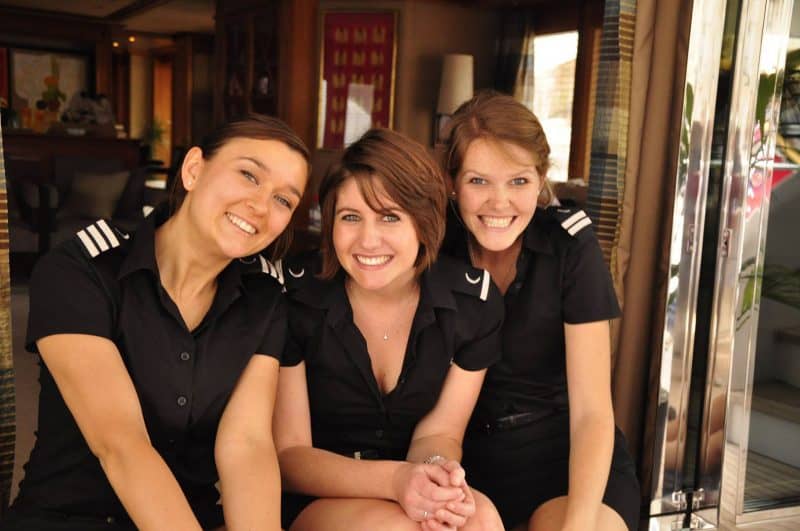
Questions to Ask Yourself Before You Commit to Working on Superyachts
It’s important to put pressure on yourself and set deadlines. Financially I only had two weeks to support myself. This was cutting it fine, but I feel that this pressure is what lead to me finding a job after only 4 days.
You’ll face rejection but will need to keep pushing through in order to secure a job. You’ll also have to justify the initial investment and if you don’t believe that you can cut it in the yachting industry, then perhaps you need to look for something less risky
Some days I worked for up to 18 hours and had very little sleep. My nails and fingers were scarred with blisters and cuts from washing so many crystal glasses. My skin went bad from not seeing the sun, and my legs were developing varicose veins from standing up all day.
But my crew were amazing. We all worked equally hard and supported each other on the difficult days. You might be lucky and find a sweet job with an easy schedule, however, prepare for the worst but this will only make you stronger.
In the end, my experience and the money I made was totally worth it. Think long and hard if you think you’re up for this kind of lifestyle. There are some that stick around and end up with great jobs who get extra tips and even flights to whatever country they want. It’s a fabulous job if you think you’re game for the challenges that come with it.
More Jobs Abroad

Do you have what it takes to work on a superyacht? Do you want to become a yacht stewardess? Let us know in the comments!
>>> Bio
Hey, I’m Carryn! I’m a nature enthusiast and passionate explorer who loves hiking, diving, and adventuring through new countries. My travels have taken me from the peaks of Kilimanjaro to the underwater worlds of Indonesia and have lead me to Korea where I am teaching English. I share my travel stories on my blog, Torn Tackies , where I aim to inspire people to step out of their comfort zone and explore the world that surrounds them.
Don’t lose this post! Click the picture to pin it for later!
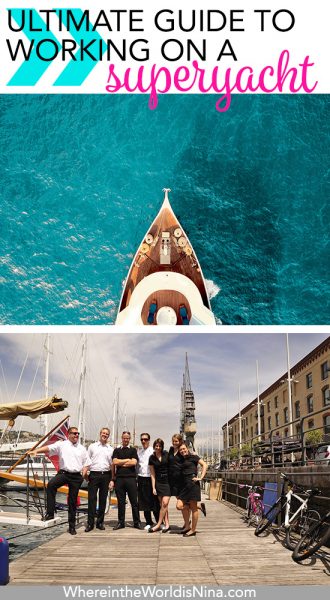
Pin this post for later!
Nina Ragusa is an adventurer, messy bun master, breakfast fan, and full-time travel blogger. She's been abroad since 2011 and blogging on Where in the World is Nina? for nearly as long. Nina helps people like you move around the world while making money. She loves talking about how to work abroad and online to travel longer! Read more about Nina
Leave a Reply Cancel reply
Your email address will not be published. Required fields are marked *
Hi Nina, thank you so much for the information. I’m looking at doing my course (again) in November. Unfortunately I didn’t pursue the yachting industry the first time I did my course as I started working on the ships. But your insight has really motivated me to try again, so thank you.
Thank you Nina for sharing your info and guiding us, i do have a question though, i am a type one diabetic, and really want to work on a yacht, i am already currently in the Hospitality industry. Do you know whether type one diabetics are allowed to work on yachts?
Great info ! Thank you so much for sharing your experience, I’m looking forward to become a stewardess, I have a question: for working in the Mediterranean Sea it doesn’t matter which Schengen visa? I might have the chance chance to do a German visa, would that work? Thank you again J+
Thank you, Nina! I am heading to Antibes on May 1st to find my first yacht job and I am super excited! I’m always reading online and checking out any information I can in order to prepare, so this blog was a prize to find as it is loaded with fantastic info!
Hope you’re having a fantastic day, wish me luck!
Yes! The best of luck 🙂
Hi nina i have already documents f Seaman book and passport Eng1, food safety and level hygiene level 2
Stcw Sdsd My probllem is only the visa i want to earn already
Can you tell me whats lacking ,
How is the procedure in landing yachts ?
I think sometimes that when i travel my own expense in goin ‘
Like france
I think its too expensive
Or i think in mind that when i applied in us embassy here in philjppines for b1b2 visa
W/out a company yet is hard for me
Coz.i didnt travel yet in any location overseas I have first in mind that i justonly denied for that
Pls can you help me my dear ffriend Can you pls.humbly assist me in my dream career I am a greenie and recently took my iyt yacht card here in manila philippines
Its been an honor to have an indtrument /way like you
On helping othera like me
I want t hear your quick Humbly help my friend
Thank you so much Nina for all of this information! You’ve made me more excited to start my yachting career. I am heading to Phuket next month to take my STCW + Stewardess course, then am hoping to head over to Antibes after to start looking for work by March 🙂
That sounds SO exciting! Have fun 🙂

The Stewardess Bible
Making Life Easier For Every Superyacht Stewardess
For every superyacht stewardess and chief stewardess aiming for excellence, “The Stewardess Bible” and “The Chief Stewardess Bible” are your ultimate and invaluable go-to resources. These original guides, unmatched in their depth and utility, have set the gold standard in yacht stewardess training, despite numerous attempts to replicate their success.
These books offer indispensable insights and solutions for handling service-oriented or operational challenges onboard for less than the cost of a night out in Porto Cervo or St. Tropez. The primary purpose of these guides is to streamline daily tasks, making them more efficient, time-saving, and stress-free for superyacht stewardess managers.
These resources are essential companions for anyone serious about their career in the superyacht industry.
“The Stewardess Bible’s Guide to Achieving Excellence in Service (Module One)” is a culmination of over 22 years of top-end hospitality experience. Initially, the yachting industry seemed like a never-ending party, with its tax-free salary and all-expenses-paid lifestyle. However, beyond the glamour, the real charm of the profession lies in working amidst some of the most beautiful and exotic destinations our planet has to offer.
Professional happiness came from working with a diverse group of social misfits and adventure seekers. My transition from sailing yachts to mega-sized motor yachts was a natural progression, driven by my love for the industry. The decision to write “The Stewardess Bible” came from recognizing a significant gap in the available theoretical support for the superyacht interior department.
The journey to completing the book was an adventure filled with balancing website maintenance, family life, and overcoming writer’s block. This therapeutic and rewarding process taught me much about patience and humility. The end result is a comprehensive guide that offers invaluable advice for everyone, from junior yacht stewardesses to management-level chief stewardesses. It includes step-by-step instructions, detailed how-to lists, theoretical information, and practical examples designed to address real-life challenges faced on board.
“ The Stewardess Bible” is an unparalleled resource that fills a critical gap in the superyacht industry, providing a solid foundation of knowledge and practical solutions. Its guidance is essential for managing the unique demands of luxury yacht service. However, while this guide is an excellent theoretical resource, it is not a substitute for hands-on training or relevant courses. “I strongly encourage diligent research when selecting a training school to ensure comprehensive learning”.
For any questions about “The Stewardess Bible’or The Chief Stewardess Bible,” please do not hesitate to contact me. I am always more than happy to assist and provide further insights to help you excel in your superyacht career.
Kylie O’Brien [email protected] 2024, the Netherlands
“Discover the ultimate interior superyacht training manual tailored for you or your superyacht.” View Products & Pricing
A Leader in Quality Superyacht Stewardess Training Information
Interior standard operational procedures.
The Stewardess Bible is an online resource offering free & affordable training information for every superyacht stewardess & is the only training manual you need.
Every piece of advice in this book is backed by 100% experience and in-depth peer-reviewed research.
Curated Products
We are so excited here at The Stewardess Bible, to introduce this unique collection of household goods, Stationary, and crew products.
Making the Stewardess Bible the go-to store for superyacht interior managers and estate managers.
Get the Latest News & Updates
Subscribe for a Free Monthly Cheat-sheet & 10% Discount off The Stewardess Bible!
No SPAM - We promise!
- We promise not to spam you because it is seriously UNCOOL!
- We will only email you when we have something wonderful to tell you.
Unsubscribe at any time.
Everything You Need In One Place

Module One - Achieving Excellence in Service
The Stewardess Bible is a powerful toolkit revealing every trade secret that will enable you to shine “in your own time” on board. The Stewardess Bible’s Guide to Achieving Excellence in Service aims to help stewardesses manage their daily tasks with more organized, efficient, stress-free strategies.

Module Two - Cocktails
The second module of the series, The Stewardess Bible’s Guide to Creating the Perfect Cocktails, includes 21 chapters and five appendices covering every angle of the art of cocktails.
From the history of cocktails to a comprehensive list of alcohol substitutions, the second instalment in The Stewardess Bible series gives stewardesses at all experience levels invaluable tips and tricks for creating perfect cocktails.

Module Three - Housekeeping Perfection
The last module, The Stewardess Bible’s Guide to Housekeeping Perfection, discusses a number of costly misjudgments.
This module helps stewardesses understand the true dynamics of their tasks, and it includes sections detailing green alternatives to harsh cleaning solvents. In addition, the third reference module includes real-life case studies on common scenarios, as well as motivational tips.
About The Stewardess Bible
Free Shipping Worldwide! Conditions Apply. Dismiss

Stewardess , All guides
Stewardess on a superyacht -10 steps to find your first job.
- July 13, 2021

How to become a Yacht Stewardess ?
Step 1 – Get Qualified Step 2 – Get the right skills and training Step 3 – Get the perfect Yachting CV Step 4 – Location – Plan your journey with your mentor Step 5 – Daywork and experience
Step 6 – Get the right Yachtie Network and Contacts
Step 7 – Get a Strong Superyacht Reference Step 8 – Start applying for our Superyacht jobs Step 9 – Ace your job interviews with your coach Step 10 – Get a job, bank account and sign contract Claim your Yachtie Careers Deckhand and Stewardess offer
Step 1 – Get Qualified as a Stewardess
Despite what you will hear…. To start working on a Superyacht there are only 3 Basic Documents required to make you qualified, and in order to start as a Stewardess you need:
- Passport (Valid 12 months)
- Basic Safety STCW Training
- Medical Certificate (Valid 6 months at least)
Step 2 – Get the right skills and stewardess training
To get an edge over other crew, some yachts require additional certificates to be held by a minimum amount of crew on board. This is called safe manning certification . If you are a Stewardess starting you should consider these:
- Food and Hygiene Level 2
- Crowd and Crisis Management
This is included in Yachtiecareers Stewardess Superyacht Course
Step 3 – Get the perfect Yachting CV
You will need to write a perfect Superyacht Stewardess CV. The sections of your CV should include:
- Contact Information
- Personal Information
- Skills and Qualifications
- Certificates
- Education & Languages
With Yachtiecareers we write the CV for you , in order to make you avoid make the mistakes of other crew and give you an edge over the competition to get your first job.
- We make sure your strengths are highlighted
- We work with graphic designers to make the lay-out appeal to Captains and recruiters
- We write it so that the overall message is selling your persona
- We structure the information correctly.
- We use industry expert writers for sentencing, paragraphing to make your CV stand out
- Most importantly you get a personal CV and can avoid using a CV-template looking like the other 20 CVs in the pile.
Step 4 – Location – Plan your journey with your Personal guide
Are you in Europe or in the US ? Depending on your location, you can use our guides and knowledge to maximise your chances to get daywork in each city.
The best places to start Yachting, in order to succeed are the following:
- Fort Lauderdale
- US West Coast
To become a Yacht Stewardess those are location hubs for Superyachts, offering you most chances to secure a job, furthermore it will connect you with people in the Yachting Industry, in addition to the Yachtiecareers network.
- Antibes, France
- Barcelona, Spain
- Palme de Mallorca, Spain
- Split, Croatia
- Genoa, Italy
That is the top-list , recommended to find daywork with no experience by Yachtiecareers, moreover it will enable you to travel and see some of the most beautiful places in Europe.
Step 5 – Daywork and experience
The best way to find daywork is to speak with your Yachtiecareers Instructor and network in the location you are currently in. You need to be flexible and ready to work and step in at short notice.
When I was starting Yachting , I spent one day day working in Portofino in Italy , the next one in Monaco and 2 days later I was in Cannes in France.
Towards the end of the week I was doing a crossing on a 50m yacht from Antibes, France to Venice, Italy.
You need to be flexible and ready to work and step in at short notice, in order to get the right opportunities.
- Network in your Location
- Use Yachtiecareers Partner Daywork App to find daywork with one click
- Let your Instructor find daywork for you
- Have your phone ready at all times
- Have your CV and business cards ready
- Use your crew house contacts
- Join relevant Facebook groups (this is not always a good idea)
We can assist you finding daywork, just text your Instructor on WhatsApp.
Step 7 – Get a Strong Superyacht Reference
Just like any other profession, network is everything. When you complete our training we are confident in your abilities and are happy to provide you with a reference.
If I am looking for a Stewardess on board and I get a recommendation from a friend or someone I know, because I will choose your CV over 10 other CVs with stronger experience. That is just reality.
So build references and network using YachtieCareers, your Instructors, people you meet in Yachting hubs and ask during your Daywork.
Step 8 – Start applying for our Superyacht jobs
The way to find Superyacht jobs as a Stewardess with no experience can be hard. By all means you can register, on regular crew agencies, crew databases and apply for jobs daily.
However you will be competing with thousands of other crew, the chances that I will even read your CV are very slim. And if I do get your CV it will be in a pile with 20 other CVs. At this point it is very important your CV has the perfect lay-out and structure.
At Yachtiecareers we have created a Superyacht recruitment platform where we focus only on junior crew. In addition to that the yachts we work with only contact us with junior crew requests and with the help of your personal Instructor you can get connected to people in the industry making it easier to land that first job.
Other ways is to network and daywork. Do nor apply for hundreds (100) of online jobs without having the perfect CV and experience, it will just be a waste of time, moreover you should spend your time more wisely.
Step 9 – Ace your job interviews with your coach
At this point, you are very close to securing your first job, since you have completed the right training and used our step by step guide to secure your first job interview, because the CV they have received has displayed your key strengths.

Before the interview, your Chief Stewardess Instructor will prepare you for the questions you might face before starting, remember that 90% of the questions will be about your CV, so know your own CV inside out before the interview to explain your past experiences.
As long as you appear willing to start the job, humble and showing a happy attitude it will get you on board if you follow the interview guide from your Instructor, as result you will secure your first Superyacht job.
Step 10 – Get a stewardess job, bank account and sign your contract
Great, because you followed our guide it has led to you securing your first Superyacht Stewardess job.
Now the fun starts. It is time to pack, to sign your contract and to get a Bank account.
We will go through your contract with you, moreover we will make sure it is either MLC compliant or giving you the basic rights as yacht crew. If you have got the interview by using the Yachtiecareers network, the Yacht will be compliant.
- We help you with your Bank Account, to get the right currency and setting it up online
- Make sure to bring your Medical Certificate, Passport and STCW certificates originals.
- Get your flight tickets
- Sign the contract
- Pack your personal belonging, you might be away a long time, therefor there is limited space on board, so you have to get it all in to one suitcase !

Yacht Deckhand Premium STCW

Yacht Stewardess Premium STCW

Yacht Stewardess Full STCW

Superyacht Deckhand Full STCW
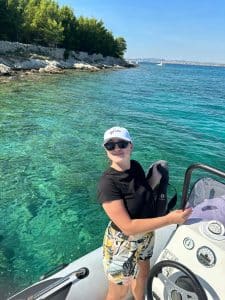
STCW Training in Holland- A Comprehensive Guide

Top 10 best places to find a Yacht job in the Med 2024?

RYA Powerboat Level 2 for yacht crew: Unlock Your Powerboating Skills
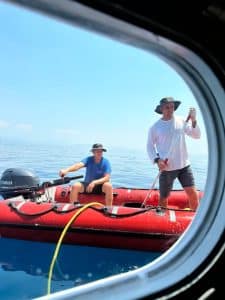
How Much Does Yacht Crew Make?

Top 10 Benefits of STCW Course Netherlands

Yacht Stewardess Training in Amsterdam

Yacht Crew Courses for Holland: Food Hygiene Level 2

Yacht Deckhand Training in United States: Upgrade Your Career at Sea
Superyacht crew training europe.

2024 Dates full. Book Final 4 spot for October date with payment plan “paylater50”
Get free yacht cv and yacht job offers

What Type of Yacht Stew Are You?
In our ultimate guide below, we’ll help you navigate the various yacht steward/ess roles and duties on luxury yachts. We’ll also explore whether yachting is the right fit for you , and the option of choosing it as a career versus a gap year . Whether you’re daydreaming about your first gig on a yacht or already out there walking the docks , understanding the ins and outs of different yacht stew roles is essential.
In This Guide:
Every boat, big or small, brings its own kind of excitement and learning experiences.

From ruling the roost as a Chief Stewardess to being the go-to person as a Sole Stew , every role is unique and packed with opportunities to grow and shine.
Ever thought about being a Hybrid Stew (Chef/Deck/Stew) ? Or how about combining your love for fitness or healthcare with yachting as a Fitness Instructor/Stew or Nurse/Stew ? Yachting is full of opportunities, with something for every ambition and skill set.
So, “What Type of Yacht Stew Are You?” . Remember, the best fit for you might just be where you least expect it!
1. Single Roles
In yachting, each single role position has its own set of clear responsibilities and areas of expertise. Every one of these roles is crucial, playing a big part in making sure everything runs smoothly and guests enjoy a luxurious experience on board.
Top of the Line:
⭐️ chief stew.
The Chief Stew leads the interior crew, similar to a Director of Guest Services in in a top-tier resort, but with added responsibilities of running the housekeeping and service departments as well.
- Management and Supervision : Overseeing the interior team, ensuring every task is performed to the highest standard.
- Guest Services : Ensuring all guest needs are met impeccably, from personalized service to handling specific requests.
- Administration : Managing budgets, inventories, and interior maintenance schedules.
- Training and Mentoring : Providing guidance and training to junior stewards/esses, fostering a cohesive and skilled team.
- Event Planning : Coordinating events and activities onboard, from intimate dinners to extravagant parties.
- Leadership Skills : Strong leadership abilities to manage and motivate the team.
- Attention to Detail : Exceptional attention to detail to maintain high standards.
- Communication Skills : Excellent communication for both team management and guest interaction.
- Organizational Skills : Proficiency in managing various administrative tasks and logistics.
- Adaptability : The ability to handle unexpected situations with grace and efficiency.
Typically, a career path to becoming a Chief Stewardess involves climbing the ranks, starting from junior stewardess roles and gaining experience in various aspects of yacht stewardship. Continuous learning through training courses and certifications in hospitality, management, and service can greatly enhance career prospects.
⭐️ Second Stew/First Service Stew
Second in command:.
The Second Stew , often known as the First Service Stew , is the Chief Stew’s right hand and is in charge of ensuring the highest standards of service are maintained on board.
- Service Leadership : Taking charge of the service team to deliver exquisite dining and hospitality experiences.
- Guest Interaction : Being a primary point of contact for guests, understanding and catering to their preferences and needs.
- Interior Management : Assisting with the management of the interior, including maintenance, cleaning, and decoration.
- Inventory Control : Overseeing the stock of service supplies, linens, and other essential items.
- Advanced Service Skills : Proficiency in fine dining service, wine knowledge, and table setting.
- Team Coordination : Ability to lead and coordinate a team effectively.
- Problem-Solving Abilities : Quick thinking to resolve issues and ensure guest satisfaction.
- Detail-Oriented Nature : Keen attention to detail in every aspect of service and interior maintenance.
⭐️ Third Stew/Second Service Stew
Ready and capable:.
The Third Stew , also called the Second Service Stew , is a real team-player and doesn’t mind helping out wherever they are needed.
- Assisting in Service : Supporting the service team during meals and events.
- Housekeeping Duties : Ensuring guest cabins and communal areas are impeccably maintained.
- Laundry Tasks : Managing laundry tasks, including washing, ironing, and careful handling of delicate items.
- Guest Assistance : Helping with guest requests and ensuring their comfort throughout the stay.
- Adaptability : Flexibility to switch between different tasks and areas as needed.
- Foundational Service Knowledge : Understanding of basic service principles and housekeeping standards.
- Eagerness to Learn : Willingness to learn and grow in the role, taking guidance from more experienced crew members.
- Strong Work Ethic : A proactive approach and commitment to maintaining high standards.
⭐️ Housekeeping Stew / Head of Housekeeping
Stealthy cleaning ninjas:.
The Housekeeping Stew , often serving as the Head of Housekeeping , is crucial in ensuring the yacht’s interior always looks fabulous.
- Interior Maintenance : Overseeing the cleanliness and upkeep of all interior areas, including guest cabins and communal spaces.
- Quality Control : Ensuring all housekeeping tasks meet the highest standards of cleanliness and presentation.
- Team Management : Leading the housekeeping team, scheduling, and assigning tasks.
- Stock Management : Managing inventories of cleaning supplies, linens, and other housekeeping items.
- Attention to Detail : Exceptional focus on details, ensuring every corner of the yacht’s interior is perfect.
- Organizational Skills : Strong ability to organize and prioritize tasks efficiently.
- Team Leadership : Capable of leading and motivating a team to achieve high standards.
- Resilience and Stamina : Physical and mental stamina to manage extensive and demanding housekeeping duties.
⭐️ Laundry Stew
The art of laundry:.
The Laundry Stew plays a vital role in the yacht’s operations, focusing on laundry management.
- Laundry Processing : Handling, washing, ironing, and proper care of all linens, uniforms, and guest clothing.
- Fabric Care : Knowledge of different fabrics and appropriate cleaning techniques.
- Inventory Management : Keeping track of laundry supplies and linen stocks.
- Timely Service : Ensuring laundry services are completed efficiently and returned to guests or crew promptly.
- Detail-Oriented Approach : Meticulous attention to detail in handling and caring for garments and linens.
- Organizational Skills : Ability to manage laundry operations smoothly and keep everything in order.
- Time Management : Efficiently managing laundry tasks to meet tight deadlines.
- Dedication to Quality : Commitment to delivering high-quality laundry and garment care.
⭐️ Sole Stew
Going solo:.
The Sole Stew is often found on smaller superyachts, where they are the sole manager of all interior duties.
- All-Round Interior Management : From service and housekeeping to laundry and sometimes even basic cooking.
- Guest Relations : Being the main point of contact for guests, handling all their service and accommodation needs.
- Flexibility and Adaptability : Juggling multiple responsibilities and adapting to changing situations.
- Versatility : Ability to handle various aspects of yacht stewardship competently.
- Exceptional Organizational Skills : Keeping track of numerous tasks and managing time effectively.
- Strong Interpersonal Skills : Excellent communication and the ability to connect with guests and crew alike.
- Resilience : Stamina and resilience to handle the extended hours and diverse challenges of the role.

2. Dual Roles
In this exciting world of yachting, dual role yacht stews are real all-rounders. They juggle their stewardess tasks with a whole bunch of other key responsibilities on board, showing off their versatile skills.
⭐️ Deck/Stew
Balancing interior and exterior duties:.
The Deck/Stew role is a dynamic fusion of deckhand and stewardess roles, needing a varied skill set to manage both interior and exterior duties.
- Exterior Maintenance : Assisting with the upkeep and maintenance of the yacht’s exterior, including cleaning, painting, and basic repairs.
- Guest Interaction on Deck : Helping with guest activities on deck, ensuring safety and enjoyment.
- Interior Service : Transitioning to interior duties, focusing on housekeeping, laundry, and guest service.
- Event Assistance : Aiding in the setup and execution of on-board events.
- Adaptability : The ability to swiftly switch between exterior and interior roles.
- Physical Fitness : Good physical condition to handle demanding deck duties.
- Attention to Detail : Precision in both cleaning and guest service tasks.
- Time Management : Juggling different responsibilities efficiently.
Challenges often include balancing the physically demanding exterior work with the meticulous nature of interior service, managing time effectively, and maintaining high standards in both areas.
⭐️ Chef/Stew
Combining culinary and hospitality expertise:.
The Chef/Stew role is a unique mix of culinary excellence and yacht duties.
- Meal Preparation : Crafting and executing menus, from daily meals to special dietary requests.
- Galley Management : Managing the kitchen’s inventory, cleanliness, and organization.
- Service and Housekeeping : Providing guest service, including table setting, service, and maintaining the cleanliness and comfort of guest areas.
- Provisioning and Planning : Handling the purchasing and planning required for meals and interior supplies.
- Culinary Expertise : Strong cooking skills and knowledge of various cuisines and dietary needs.
- Multitasking Ability : Balancing kitchen duties with stewardess responsibilities.
- Creativity and Innovation : Being creative in menu planning and meal presentation.
- Organizational Skills : Efficiently managing both the galley and interior duties.
The main challenges in this role are time management, especially when balancing cooking with service duties, and maintaining energy levels during busy periods.
Finding the right fit is key to a rewarding experience in this unique and dynamic industry.
3. Specialized Roles
Specialized roles in yachting combine traditional yacht stew duties with specific skills and qualifications, elevating the luxury experience for guests.
⭐️ Nurse/Stew
Combining medical expertise with traditional yacht stew duties:.
The Nurse/Stew role typically caters to guests and owners needing extra care onboard, beyond what the Captain or First Officer, who usually handle medical duties, can provide.
- Medical Care : Providing first aid and managing medical emergencies onboard.
- Health Monitoring : Regularly monitoring the health of guests and crew, especially during longer voyages.
- Stewardess Responsibilities : Balancing nursing duties with standard stewardess tasks such as service, housekeeping, or laundry.
- Nursing Qualifications : A professional nursing background with valid certification.
- Emergency Response Skills : Training in emergency medical response and first aid.
- Adaptability : Ability to switch between medical and hospitality roles.
Typical scenarios include handling minor injuries, managing chronic conditions of guests or crew, and being prepared for any medical emergencies.
⭐️ Fitness Instructor/Stew
Incorporating fitness and wellness into the yacht experience:.
This role combines fitness instruction with regular yacht stew duties, offering guests personalized wellness and fitness programs.
- Fitness Training : Conducting personal training sessions, group workouts, or yoga classes.
- Wellness Programs : Developing wellness programs tailored to guest preferences.
- Stewardess Tasks : Providing standard stewardess services alongside fitness duties.
- Fitness Certification : Professional training and certification in fitness instruction, personal training, or yoga.
- People Skills : Strong interpersonal skills to motivate and engage guests in fitness activities.
- Flexibility : Balancing fitness sessions with other interior responsibilities.

4. Niche Roles
⭐️ spa manager/stew nanny/stew engineer/stew.
These roles represent a fusion of yacht stew duties with specialized skills, each adding a unique touch to the luxury yachting experience.
- Spa Manager/Stew : Offers beauty and spa services such as facials, manicures, or hair styling in addition to stewardess responsibilities. Requires spa management qualifications.
- Nanny/Stew : Specializes in childcare alongside standard stewardess tasks. Childcare experience and relevant qualifications are necessary.
- Technical Skills : Proficiency in yacht maintenance and engineering, backed by AEC 1 and AEC 2 certifications.
- Hospitality Skills : Training and experience in hospitality to manage stewardess duties effectively.
- Versatility : Ability to seamlessly transition between technical maintenance and guest service.
Each of these roles enhances the yachting experience by better meeting the different needs of guests and owners. Not only do they require competency in typical yacht stew tasks , but they also necessitate specialized skills and certifications in their respective areas of expertise.

5. Hybrid Roles
⭐️ chef/deck/stew.
This role really stands out for being super versatile in multiple departments, especially since this position is mostly found on smaller yachts. Often part of a couples position , this role is typically paired with a partner serving as the Captain/Engineer, creating a comprehensive team that manages all aspects of yacht operations.
Mastering the Galley, Deck, and Interior:
The Chef/Deck/Stew is a triple-threat , skillfully handling responsibilities in the galley , on deck , and within the interior .
- Culinary Expertise : As the chef, this role demands preparing and presenting meals, planning menus, and provisioning. It requires culinary creativity, knowledge of various cuisines, and the ability to cater to diverse dietary preferences.
- Deckhand Duties : On deck, tasks include maintaining the yacht’s exterior, assisting with docking and anchoring, and ensuring guest safety and enjoyment in outdoor activities.
- Steward/ess Responsibilities : The interior duties cover housekeeping, service, and ensuring guest comfort and satisfaction. This encompasses everything from room preparation to laundry, and providing top-notch service during meals and events.
- Adaptability and Flexibility : The ability to efficiently transition between cooking, cleaning, and deck maintenance.
- Time Management and Efficiency : Balancing the various tasks effectively, maintaining high standards across all areas.
- Physical Stamina and Resilience : Handling the physically demanding aspects of the role, with long working hours.
- Excellent Organizational Skills : Keeping track of multiple duties and ensuring every aspect of the job is handled impeccably.
The main challenge lies in managing the diverse responsibilities and the need to constantly switch gears, often with limited downtime. This role requires not only a varied skill set but also a strong passion for yachting and a dedication to delivering an exceptional experience to guests.
Whether you dream of specializing in one area or you’re up for the challenge of wearing multiple hats, there’s a perfect place for you in this exciting industry.
First-Time Yacht Stew? Learn These 71 Terms
6. Finding Your Fit: Is Yachting Right for Me?
Choosing a role in the yachting industry is about aligning your skills, interests, and lifestyle preferences with the right position. It’s an exciting journey of self-discovery and professional growth .
1. Understanding Your Strengths and Preferences:
Start by assessing your skills and interests. Recognize your strengths (and weaknesses) and consider how they align with various yacht stew roles. Take a free online personality test like the one from Myers-Briggs (16Personalities). A personality test can help you figure out your strengths, weaknesses, and skills. By providing insights into your character traits, behavioral tendencies, and preferences , these tests can guide you in understanding where you excel and areas that may need improvement.
2. Questions to Ask Yourself:
- Do I get seasick? This is a big one. Suffering from seasickness can be debilitating and even dangerous. It also puts an added burden on your fellow crew who end up having to pick up the slack. If you’ve never been to sea before, then we suggest testing your tolerance before spending money on courses, certifications, visas, flights, etc. Medication does not always work .
- What are my strongest skills and how do they translate into yachting roles? (e.g., organization, service, culinary skills) Do I have a passion for culinary arts, or do I excel in providing top-notch guest service?
- Do I prefer working in a team or independently? This can help decide between roles like a Sole Stew or being part of a larger interior crew.
- Am I looking for variety or specialization in my work? Am I more inclined towards meticulous interior work or do I prefer being active on the deck, or both? Consider dual roles or specialized positions if you have specific skills or certifications.
- How do I handle physical demands and high-stress environments? Assess your physical fitness and stress management abilities for more demanding roles.
- How do I feel about confined spaces? Will I be able to cope having to share a small cabin with a stranger? You will be sharing a cabin and head (bathroom) with another crew member, usually of the same gender (MCA rules) but not always.
- What are my long-term career goals? Think about how each role can pave the way for future opportunities in the yachting industry.

3. Balancing Lifestyle and Professional Goals:
Yachting roles come with unique lifestyle implications . Reflect on how comfortable you are with the demands of yacht life , such as being away from home for extended periods or working unconventional hours . Consider how each role aligns with your personal life and career goals .
4. Seeking Advice and Gaining Experience:
Don’t hesitate to seek advice from seasoned professionals in the industry. Their insights can be invaluable in understanding the realities of different roles. Additionally, consider gaining experience in various areas to get a better sense of what suits you best .
Remember, finding your fit in the yachting world is a personal journey . It’s about finding a role that not only utilizes your skills and talents but also fulfills your personal and professional goals. Take the time to reflect, explore, and choose the path that resonates most with you.
7. What Yachting Means to You: Career or Gap Year?
Pursuing a role in the yachting industry can serve various purposes, from a gap year adventure to the start of a long-term career . It’s important to recognize that everyone’s journey is unique , shaped by personal goals, motivations, and circumstances.
1. Short-Term Ventures and Life Experiences:
For many people, working in yachting is an opportunity to explore the world , earn money, and gain life experiences before settling into university studies or a different career path. It offers a chance to develop a range of skills , from teamwork to service excellence, that are valuable in any future endeavor.
2. Considerations for Short-Term Stints:
- Initial Investment : Be aware that entering the yachting industry requires upfront investment in mandatory certifications and training, such as STCW.
- Competitive Landscape : With many aspiring crew members, securing a position might be challenging, so be prepared for a competitive job market.
- Financial Goals : While the ‘quick buck’ scenario has become less common due to increased qualification costs and competition, yachting can still provide a substantial income for those looking to save for future plans.
3. Building a Career in Yachting:
For others, yachting is a career choice , offering a path filled with growth and diverse opportunities.
This includes:
- Long-Term Career Progression : For those aiming for a long-term career, there are opportunities to advance from junior roles to senior positions, like Chief Steward/ess or transitioning into specialized roles.
- Continuous Training and Certification : Ongoing education is vital for safety and service excellence, and it paves the way for career advancement.
- Networking and Industry Connections : Building a strong network is crucial for both short-term and long-term yachting professionals. It opens doors to new opportunities and is key for staying informed about the industry.
4. Personal Motivations and Reflections:
Regardless of your reason for entering the yachting industry, consider your personal motivations:
- Why am I pursuing yachting? (e.g., financial goals, adventure, career development)
- What are my post-yachting plans? Reflect on how this experience will contribute to your future goals.
5. Adapting to Industry Realities:
Be prepared for the realities of yacht life – long hours, demanding work, and the need for flexibility . Whether it’s for a season or a longer-term career, these experiences can be incredibly enriching and valuable.
Surviving Your First 10 Days Onboard: A Green Yacht Stew’s Guide

8. Final Say
In yachting, one thing is crystal clear: finding the right fit is key to a rewarding experience in this unique and dynamic industry. Whether you’re drawn to the seas for a short adventure or envisioning a l ong-term career, the role you choose should align with your abilities, interests, and personal goals.
1. Embracing Your Unique Path:
Every stewardess or steward brings their own set of skills and preferences to the table. Some thrive in the detailed, service-oriented environment of interior roles, while others find their calling in the multifaceted responsibilities of a dual role . And then, there are those who excel in specialized positions , combining their unique skills with the core duties of a yacht stewardess.
2. The Power of Self-Reflection:
Understanding your strengths and what you enjoy is crucial. Reflect on what excites you about yachting – is it the travel , the service aspect, the chance to use specialized skills , or the thrill of multitasking across various roles? Your answer to this question will guide you to the role that best suits you .
3. Adapting and Growing:
Remember, your initial choice doesn’t have to be your forever path. The yachting industry offers room for growth and change. You might start in one role and discover a passion for another area as you gain experience. Be open to learning , adapting, and evolving your career path as you go.
4. A Rewarding Adventure Awaits:
No matter what role you choose, a career in yachting promises adventure , personal growth, and the chance to create unforgettable experiences for yourself and your guests. It’s about finding a balance between professional aspirations and personal fulfillment, and enjoying the journey every step of the way.
Top Guide to Slaying Your First Yacht Stew Job Interview
Share Your Story 🛥💙
Share your stories, questions, and experiences with us. Let’s keep this conversation going. Whether it’s through messages, emails, or social media, we want to hear from you. How are you navigating the thrilling world of yachting? What tips and tricks have you discovered? Let’s build a community of passionate, informed, and confident crew members.

Want a FREE Yachting CV Template Pack ?
We created easy-to-use templates for you! Pack includes: • Cover Letter • Full Yachting CV • Social Media Safe CV • Tips and Instructions
Scammers Want Your Yachting CV

Since 2006, Leanne has worked in various roles on luxury yachts, from Chief Stewardess to Chef/Deck/Stew, navigating the ins and outs of yachting around the world. Currently, she is enjoying life as a freelance Chief Stew.
Our socials
Quick links.
COPYRIGHT 2024. All rights reserved.
Download Our Free Checklist
The Ultimate Cleaning Caddy Checklist
All fields are required.
We value your privacy at Yacht Stew Guide. We use the information you provide to us to contact you about our relevant content, resources, and industry updates. You can unsubscribe from these communications at any time. For more details, please check out our Privacy Policy .

- SCTW certificates are valid for up to five years. After five years, you must take a fire fighting and sea survival refresher course.
- Make sure your course is certified by a national maritime organization in the country where you complete it.

- Medical conditions that may inhibit you from receiving your ENG1 include, but are not limited to: epilepsy, heart disease, kidney failure, color-blindness, and history of drug/alcohol addiction. [3] X Research source
- If you are working on a small boat operating 60 miles from shore or less, an ML5 will suffice as a substitute for an ENG1.

How to Find a Job as a Yacht Stewardess

- Living near a yacht hub between jobs can be expensive. Look into a crew house - a privately-owned, budget-friendly accommodation where yachties and former yachties live - to stay while you network, complete your training and look for work. [5] X Research source

- Make sure you look presentable while you network. Yacht stewardesses are extremely clean and well-groomed. Dress for the part you want by wearing deck shoes and an appropriate yacht shirt.

- Jobs like bartending, nannying, customer service, and cleaning all look good as these types of duties will be performed on the yacht.
- Look into doing free day work on boats to help build your sea legs and make connections with captains and crew.

- All yacht CV’s list certifications, work history, nationality, spoken languages, body modifications, references, and relevant skills. Some are even more in-depth with details like smoking habits and overall objective. [9] X Research source
- There are several free yacht CV templates online to help ensure yours fits the industry norm.
- Don’t be afraid to play around with the formatting. Your CV should be professional but also as unique as possible.

- Most interviewers are also looking for excellent presentation, leadership, and communication. Make sure to highlight these attributes when you answer their questions. [11] X Research source
You’d Make a Good Yacht Stewardess If…

Benefits of Being a Yacht Stewardess

A Day in the Life of a Yacht Stewardess

Yacht Stewardess Pay

- Yacht stewardesses also have no living expenses since food, housing, electricity, water, even toiletries are provided on the ship. [22] X Research source
- Depending on the countries you sail out of, this can sometimes be tax-free!
- Tips are usually divided evenly among the crew.
Expert Q&A
You might also like.

- ↑ https://www.ypicrew.com/yacht-work-job-qualifications
- ↑ https://uksa.org/what-is-an-eng1-medical-certificate/
- ↑ https://www.flyingfishonline.com/useful-stuff/eng-1-medical/
- ↑ https://slightnorth.com/how-to-work-on-a-yacht/
- ↑ https://www.yachting-pages.com/articles/crew-housing-and-accommodation-in-the-superyacht-industry.html
- ↑ https://yachtstewardess.co.za/how-to-become-a-superyacht-stewardess/
- ↑ https://www.indeed.com/career-advice/resumes-cover-letters/yacht-crew-cv
- ↑ https://www.ypicrew.com/yacht-interview-tips-from-recruiters
- ↑ https://stewardessbible.com/the-interview-process-selecting-the-right-stewardess/
- ↑ https://www.cnn.com/2018/08/23/sport/superyacht-stewardess-spt-intl/index.html
- ↑ https://www.pya.org/News/Crew-Accommodation-in-Large-Yachts.aspx
- ↑ https://expertvagabond.com/yacht-crew-jobs/
- ↑ https://www.flyingfishonline.com/news/is-yachting-a-good-career/
- ↑ https://www.oceaninternationaltrainingacademy.com/working-on-a-yacht?r_done=1
- ↑ https://climbtheladder.com/yacht-stewardess-cover-letter/
- ↑ https://nypost.com/2018/09/03/working-on-a-superyacht-is-like-being-in-a-glamorized-pressure-cooker/
- ↑ https://www.linkedin.com/pulse/what-its-like-work-yacht-crew-nicola-morgan/
- ↑ https://www.luxyachts.com/articles/three-primary-factors-combine-to-determine-the-salary-of-a-yacht-stewardess
- ↑ https://www.businessinsider.com/yacht-stewardess-florida-earns-5000-month-travel-careers-2022-4
About this article

Did this article help you?

- About wikiHow
- Terms of Use
- Privacy Policy
- Do Not Sell or Share My Info
- Not Selling Info
- Brokerage New Construction How to Buy How to Sell
- Yacht Fleet Yacht Catalog Charter Marketing Destination Guides
- Financial Services Payroll & Accounting Payroll Service Process Logistical Support Admin Services Crew Admin
- Job Descriptions Crew FAQ
- About Sitemap
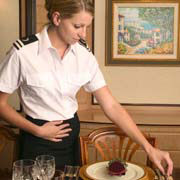
- Yacht Department Directory
- Interior Department
- Steward/ess
About the Steward/ess
The stewardess onboard a superyacht is a hard worker with a positive, can-do attitude that takes instruction well and has an impeccable attention to detail. No detail is overlooked by a successful yacht stewardess (i.e. towel folds, perfectly ironed pillow cases). A friendly, professional character with guests is essential as is discretion and maintenance of guest privacy. This candidate will have one year of experience on a yacht or very strong experience on shore.

Job Responsibilities
- Setting stewardess schedules for guest service and cleaning
- Interior cleaning and maintenance
- Interior inventory
- Interior accounting
- Liaison with guests and service - meals and bartending
- Liaison with galley for meal services
- Orchestrating guest activities
- Boat stowage for sea
- Assisting with lines and fenders on deck
- Assisting captain with ships paperwork
Required Skills
- Ability to delegate
- Good communications, organization and diplomacy
- Vast knowledge of wines, service and housekeeping
- Knowledge of restaurants and activities in cruising areas
- Familiar with ISM and ISPS protocols
- Knowledge of flower and table decorations
- Attention to detail
- Financial management
Salary Modifiers
- Experience in five-star establishments (i.e. Michelin star restaurant, fine hotel)
- Wine certification
- Tender driving certification
- Limited computer skills
Position Statistics
Career path, chief stewardess, head of housekeeping, second stewardess, laundry stewardess, junior stewardess.
LISTEN TO THE PODCAST
Free masterclass, yachting courses, watch my free live masterclass "how to get a job on a yacht" .

back to blog
7 Ways To Nail Your First 7 Days As A Yacht Stew.
Freebie alert: Junior Stews Download now
![[PenelopeTemplate]taylor-simpson-azI_KfAnC8E-unsplash martini mondays public relations and strategy brisbane](https://static.showit.co/400/-j3kPzfNRjm8JSippHi7Dw/shared/penelopetemplate_taylor-simpson-azi_kfanc8e-unsplash.jpg)
Blog Categories
Superyacht jobs, life onboard, about yachting, listen now.
Hear about the real yacht life, info on how to kickstart your superyacht career and tips on becoming a super stew.
The Seaworthy Stew: Podcast
![[PenelopeTemplate]content-pixie-VIh-B-bNZMc-unsplash martini mondays public relations and strategy brisbane](https://static.showit.co/400/sgOjawVZS0WmIQiKY2Ntrg/shared/penelopetemplate_content-pixie-vih-b-bnzmc-unsplash.jpg)
A Chief Stew with 6+ years experience in the superyacht industry. I help aspiring crew confidently land their first job and teach the skills needed to be a stand out YACHT STEW.
Hey, I'm Jess

Superyacht Crew What to Pack?!
Filed under:.

Tune in via
Listen now- check out the seaworthy stew podcast here.

Wondering what to pack in your suitcase when embarking on your yachting adventure to find a job?! When I first left Australia in search of a job on yachts, I had zero winter clothes 🤦🏻♀️ thinking I would get a job on a boat and be chasing summers around the world.
…What I didn’t realise is yachts can be doing shipyards in the European winters, your “off” time will most likely not be in the summer and you pretty much live in air conditioning onboard. *Brrrrr
To help make it easier for you, I’ve made a GO-TO Yacht Crew Travel Packing list which you can download below. From the staples to the extras you may want to consider. From how many bikinis you actually wear, to seamless underwear (girls) and how to half your toiletries.
Other items to consider: • Do not pack a hard suitcase, space is SO limited onboard. You must buy a soft top suitcase. My go-to is from Eastpak and has lasted so many years through so many boats and travel adventures, it folds flat and is easily stored away • Noise cancelling headphones (In my eyes very necessary onboard… from drowning out anchor noises to noisy roommates) I have a pair of Bose Noise cancelling headphones which have lasted for nearly 6 years • Photos from home 🤍 • Hard copies of all your yachting certificates (must not forget these… also save a scanned version to a USB or send it to your email so can email them quickly to recruit agencies and captains)

listen to the podcast
About .
I’m a chief stewardess with over 6 years experience working in the superyacht industry on boats up to 88m. I help aspiring yacht crew by propelling them with the know-how and tools to confidently break into the superyacht industry.
Hey, I'm Jess a friendly Yacht Stew here to help!

@THESEAWORTHYSTEW

privacy & terms
© 2020 the seaworthy stew, masterclass, listen on the podcast.

welcome, friend

How to Become a Superyacht Steward(ess)
All you need to know about starting a career a steward(ess) on a yacht
Steps to Get a Job as a Yacht Steward/Stewardess:
- Understand the role of a Steward/Stewardess onboard a yacht
- Complete Steward/Stewardess training courses
- Obtain an ENG1 or ENG1 Equivalent Medical Certificate
- Select the correct time to travel and look for work
- Obtain visas & documentation
- Create a superyacht CV
- Apply for jobs
- Gain additional/transferable skills
- Keep up to date with the latest Steward/Stewardess jobs
- Mentally prepare yourself

1.Understand the Role & Duties of a Yacht Steward/Stewardess
The structure of the interior department varies depending on the size of the yacht. The duties of a steward or stewardess change accordingly.
Small yachts require diverse interior staff who can help with service, laundry, food preparations and at times help on with deck operations. Large yachts have a more segmented approach with roles focused on specific areas of service or housekeeping.
It is advisable to understand what the position entails so that you have realistic expectations of the job at hand.
2.Yacht Steward/Stewardess Training Courses
All superyacht crew need to hold both mandatory and department specific qualifications. All interior crew need to hold an STCW Basic Training Certification , including Proficiency in Security Awareness or Proficiency in Designated Security Duties , a Food and Hygiene Level 2 Certificate as well as other courses depending on your desired role and vessel type.
Although training courses are not cheap, it is important to invest in yourself and your employability. At the end of the day, it comes down to your budget and career goals.
Find Out More About Steward / Stewardess Training Courses
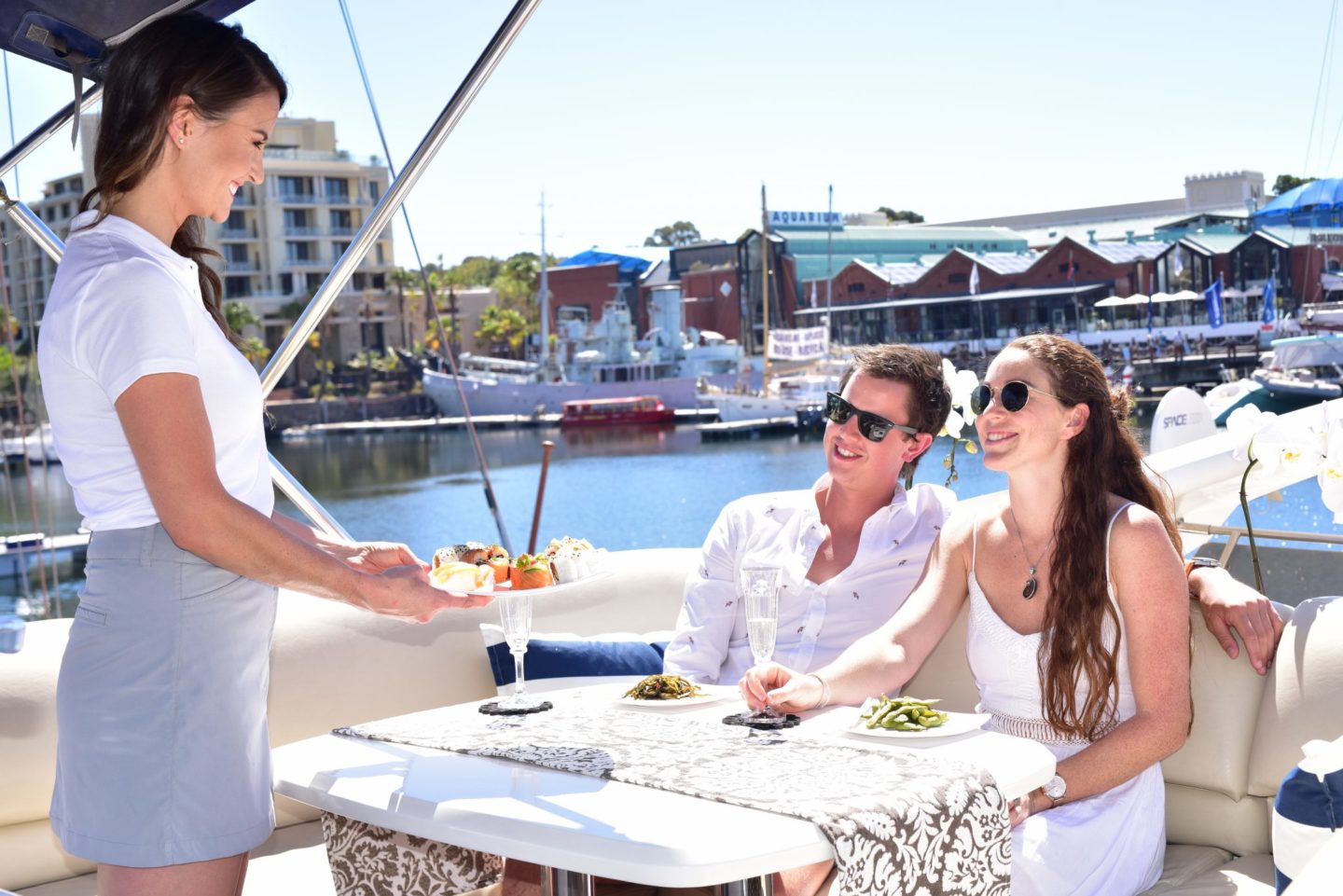
3.Complete The Essential Requirements For All Crew
Now that you have a good understanding of what being a stewardess is about and you have completed the necessary training, it is time to take action. All crew need to hold an ENG1 medical certificate which will certify you as fit to work at sea. Visas are required in order to travel to super yachting locations to attend interviews. You need to register with crew agents and ensure that you are applying for jobs wherever possible. Building a positive reputation together with a strong network of individuals involved in the industry is key.
Complete The Steps To Start Working On A Superyacht.
4. Gain Additional Steward/Stewardess Skills:
In addition to the above mentioned steps, there are many other transferrable skills that will benefit your chances of being employed as a successful stew. These include, but are not limited to the following:
- Table Service or Silver Service
- Bartending/Cocktail Mixing
- Flower Arranging
- Table Setting
- Boat Driving Experience
- Childcare & Teaching

5. Apply For Steward/Stewardess Jobs
In order to find the right job as a Steward/Stewardess, it is essential to stay up to date with the latest yacht and superyacht positions.
You can do this on My Crew Kit's easy to use job aggregator board! Make sure to sign up so that you can save all of the jobs you are interested in, in your account.
View Available Stewardess Jobs
Yacht Steward/Stewardess Career Assistance
In order to become a successful yacht steward or stewardess you should be an energetic, enthusiastic and presentable individual who possesses a strong work ethic with a passion for hospitality.
Becoming a stew onboard the superyachts is not for the faint hearted as the job requires a lot of hard work. With hard work comes great benefits such as travelling the world, days off in spectacular destinations, a thriving social life, great holidays and good pay.
If you have any questions, it is best to speak to a superyacht Steward/Stewardess training expert.
Get In Touch With An Expert
Username or Email Address *
Remember me Lost your password?
Username or Email
Get New Password

COMMENTS
All things yachting on my BLOG here... I'm a chief stewardess with over 6 years experience working in the industry. After many years travelling the world working on some of the worlds most renown superyachts, I want to share with you how you can do it too! Whether you're over your 9-5 and dream of travelling the world whilst getting paid ...
Consider sending along your résumé/CV in advance, with expected course-completion dates listed. If possible, go ahead and schedule your personal interview. (Chapters 9 and 10) Book that airplane ticket, and move to a hiring port. (Chapter 8) Once you are physically in a hiring port, go meet with the agencies.
Step 2: Obtain the Necessary Certifications and Training. To become a yacht stewardess, you need to have a basic understanding of maritime safety procedures and first aid. You can obtain this knowledge by taking the following courses: STCW (Standards of Training, Certification, and Watchkeeping) Basic Safety Training. Personal Survival Techniques.
Recommended Courses if You want to Become a Yacht Stewardess / Steward. 3. Create the Perfect Yacht CV. 4. Apply for your Visa if Necessary. 5. Locate Yourself in the Right Place at the Right Time. 6. Day Working and Dock Walking for a Yacht Stewardess / Steward.
Top Tips For Working as a Stewardess. On larger yachts, the chief stew will provide his or her team with a checklist of duties to perform for each shift. "The routine will generally be the same," says Chief Stewardess Tracey Bamforth. "You will be allocated a shift, shift duties, and shift expectations. You will wake up and dress in your ...
The Seaworthy Stew Blog. Leaving my 9-5 job to start a new career at sea and get paid to travel the world was the best decision I ever made. Today I am forever grateful for the opportunities yachting gave me, from paying off my university debts to setting myself up financially and STILL having the abilty to travel to […]
excellent communication skills. ability to work well under pressure. strong organisational skills. adaptability and flexibility. problem-solving abilities. teamwork and collaboration. Having the right skillset is crucial for a superyacht stewardess to succeed in their career and to climb the ladder of success.
The Seaworthy Stew. Your First Service Role As A Stewardess: The Breakfast Shift. 30. 00:00:00 / 00:27:45. 30. Learn all about service as a yacht stewardess with The Seaworthy Yacht Stew Online Training Course. Includes video training, service styles, service cheatsheet, pre-meal checklist, table setting, glassware guide and more!
The YM blog is the leading place to learn yacht stewardess tips and hacks. Master how to be more productive and efficient at work.
Julie Perry spent three years as a mega-yacht stewardess, which took her to over 40 ports in 18 countries. And she can tell you how to do it, too. The first edition of her book, "The Insiders' Guide to Becoming a Yacht Stewardess," has been a must-read guide for yacht crew since 2006. With the release of her updated, second edition, Julie ...
If you want to land a job as a stewardess, you will need to take some short courses that ensure safety and good service on the yacht. If you are looking for an entry-level position, then you will take the most standard courses, while those looking to become a chief stewardess will have to go back to school for further certifications.
From a Stew to Future Stews, here are 10 things no one tells you before you become a yacht stewardess…. You will laugh until you cry and cry until you laugh somedays as you are challenged physically, mentally and emotionally. Remember to be kind to yourself.. You quickly develop a new love for a hoover (vacuum cleaner) learn to drive ...
4.1 Dress the Part. First impressions matter, so dress professionally and appropriately for your yacht stewardess interview. Opt for a tidy hairstyle, light makeup, and a polished appearance. Wear a polo shirt paired with a skirt, skort, or shorts in navy, black, or beige.
Yacht stewardess salaries vary depending on several factors, such as the size and type of the yacht, level of experience, expertise, and the region. Salaries can range from $1800 - $ 3000 per month as a junior Steward/ess. Additionally, many yacht steward/esses receive tips from satisfied guests, which can significantly increase their earnings.
Compensation for chief stews runs anywhere from $3,450 to $5,650 a month on smaller yachts (80 to 140 feet) to $5,200 to $8,000 a month on yachts over 140 feet. It is very common now to see $65K and $70K salaries, or even $90K+ on the much larger vessels. Salaries for entry-level yacht stewardesses start out between $30K-$43K a year, or ...
4. Visa Requirements for Working on Superyachts. Caribbean: If you're heading to the United States of America, you'll need a B1/B2 Visa. Mediterranean: A Schengen visa is required if you are going to France or Spain. Seaman's Book: Once you find a job working on a super yacht, you need to arrange a seaman's book.
For every superyacht stewardess and chief stewardess aiming for excellence, "The Stewardess Bible" and "The Chief Stewardess Bible" are your ultimate and invaluable go-to resources. These original guides, unmatched in their depth and utility, have set the gold standard in yacht stewardess training, despite numerous attempts to replicate their success.
Step 5 - Daywork and experience. Step 6 - Get the right Yachtie Network and Contacts. Step 7 - Get a Strong Superyacht Reference. Step 8 - Start applying for our Superyacht jobs. Step 9 - Ace your job interviews with your coach. Step 10 - Get a job, bank account and sign contract Claim your Yachtie Careers Deckhand and Stewardess offer.
3. Adapting and Growing: Remember, your initial choice doesn't have to be your forever path. The yachting industry offers room for growth and change. You might start in one role and discover a passion for another area as you gain experience. Be open to learning, adapting, and evolving your career path as you go. 4.
How to Find a Job as a Yacht Stewardess. Travel to a yachting hub. To get a job on a yacht, you need to go where the yachts are. The major spots people dock yachts/hire for yacht work are Antibes, Fort Lauderdale, and Palma de Mallorca. Once you've arrived, talk to locals, wander the docks, and see if there are any positions open.
Experience in five-star establishments (i.e. Michelin star restaurant, fine hotel) Wine certification. Tender driving certification. Limited computer skills. Yacht Steward or Stewardess have 0 - 3 years experience and are responsible for interior cleaning and maintenance. They earn $30K-38K based on yacht size & experience.
To help make it easier for you, I've made a GO-TO Yacht Crew Travel Packing list which you can download below. From the staples to the extras you may want to consider. From how many bikinis you actually wear, to seamless underwear (girls) and how to half your toiletries. Other items to consider: • Do not pack a hard suitcase, space is SO ...
2.Yacht Steward/Stewardess Training Courses. All superyacht crew need to hold both mandatory and department specific qualifications. All interior crew need to hold an STCW Basic Training Certification, including Proficiency in Security Awareness or Proficiency in Designated Security Duties, a Food and Hygiene Level 2 Certificate as well as other courses depending on your desired role and ...